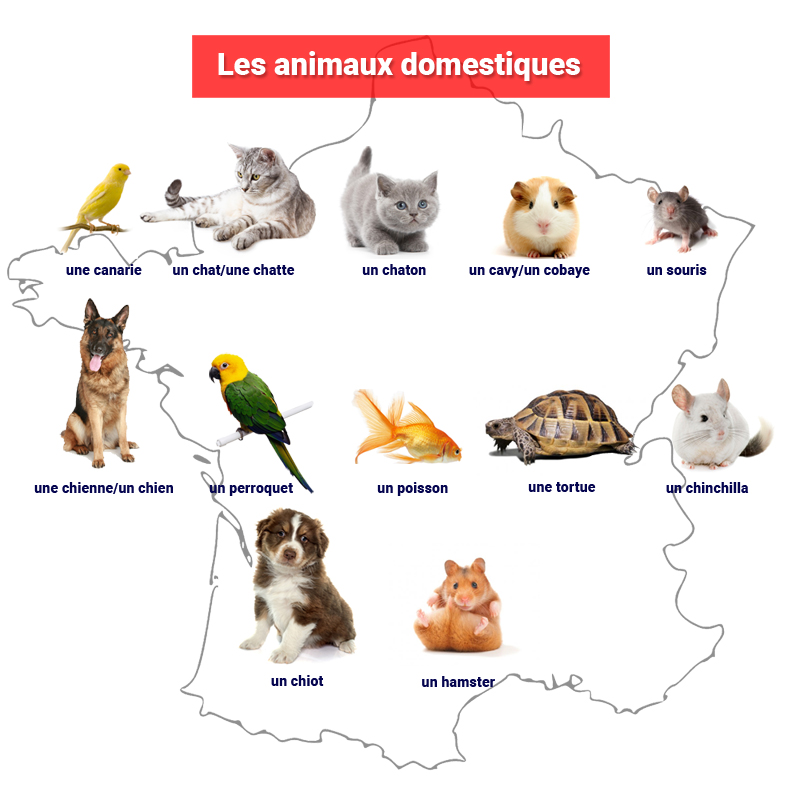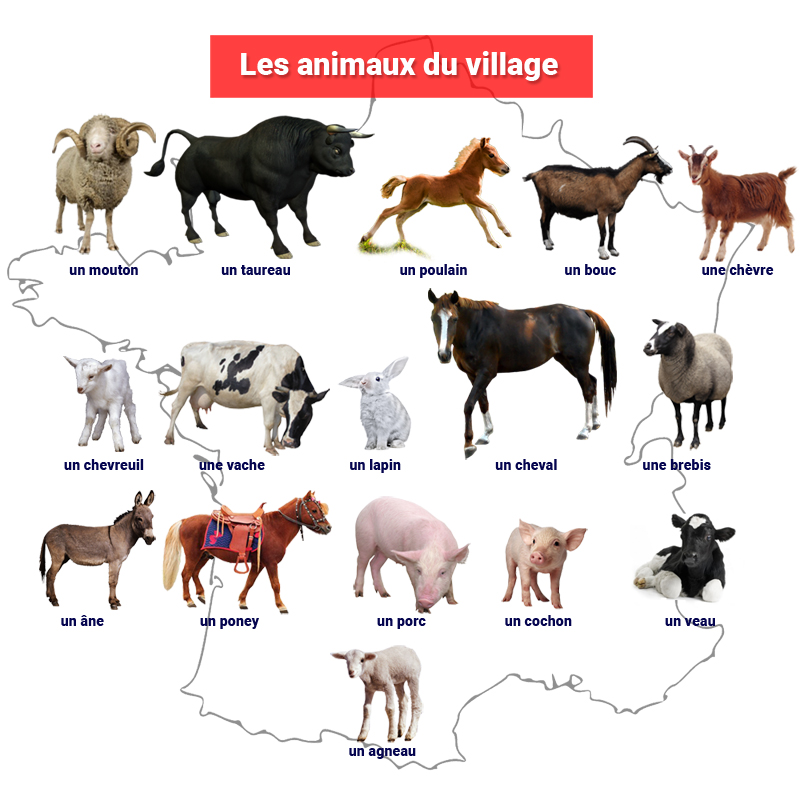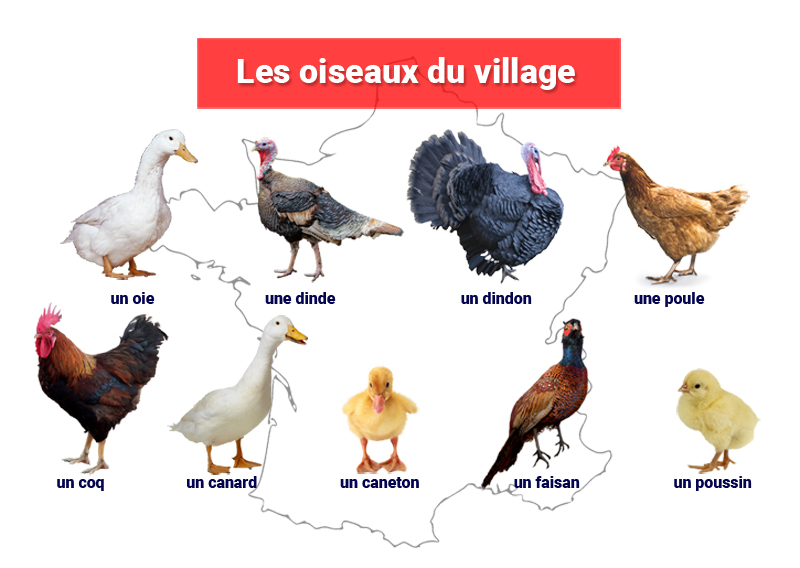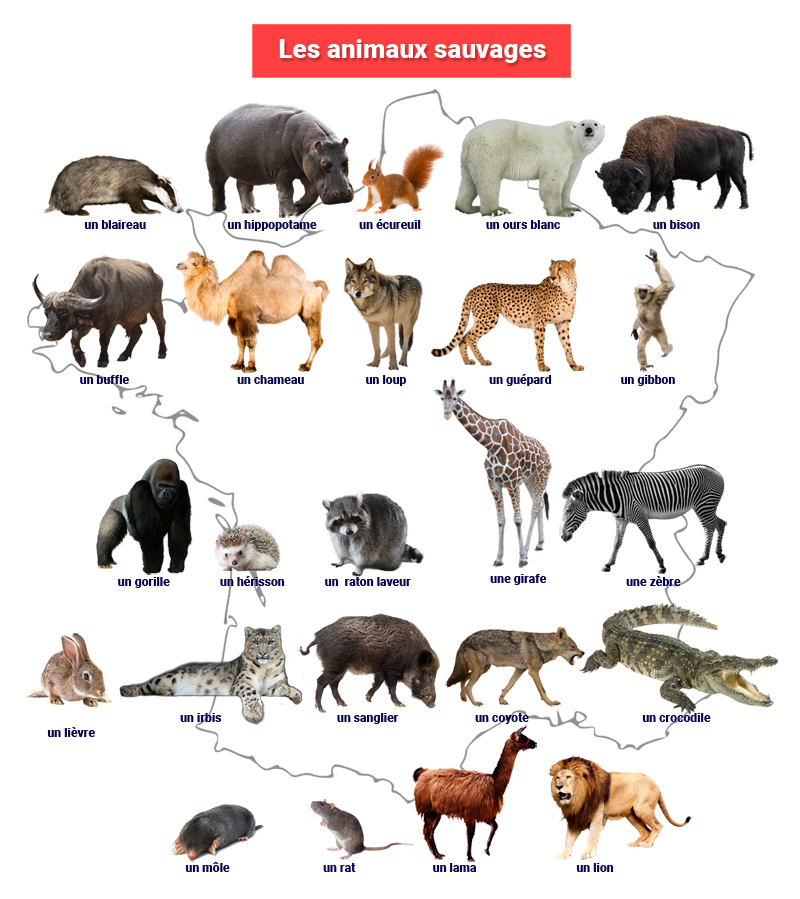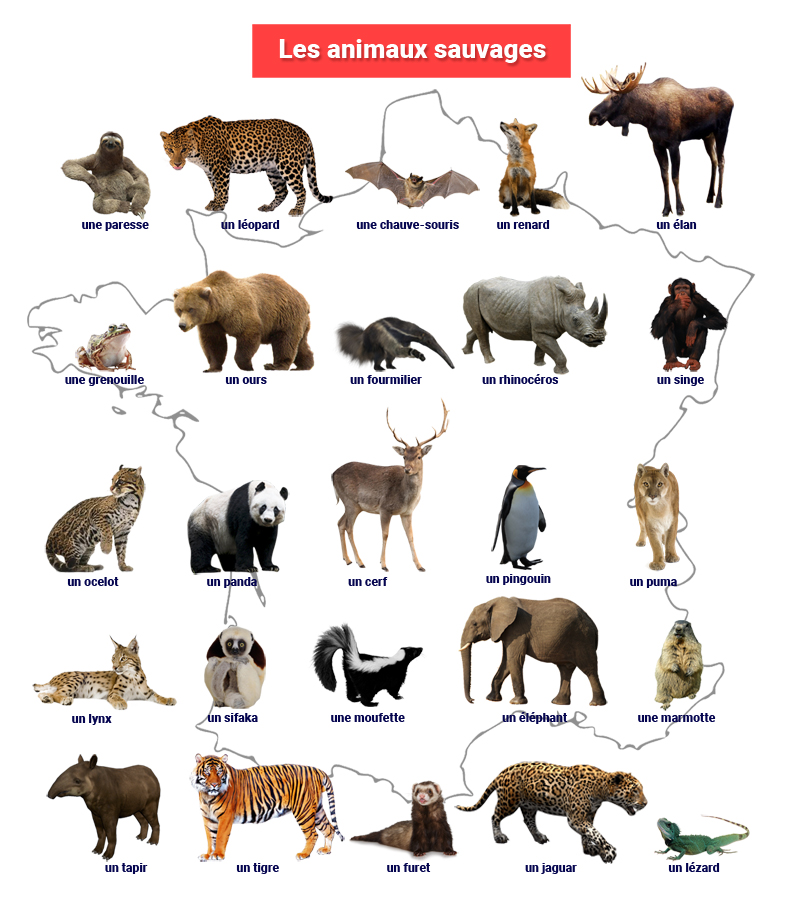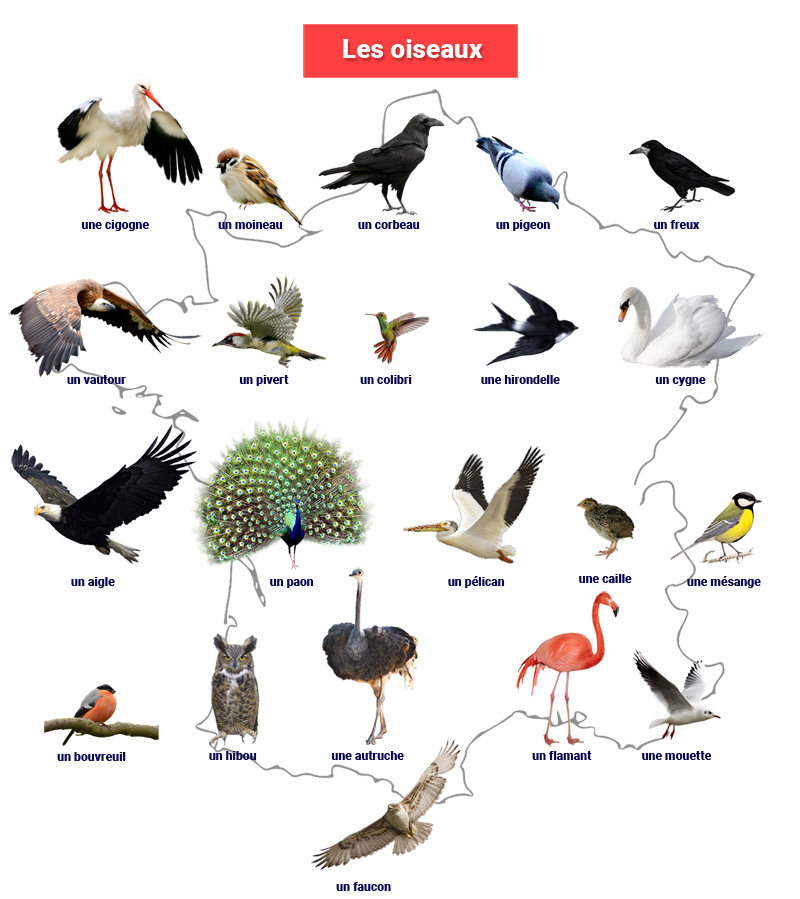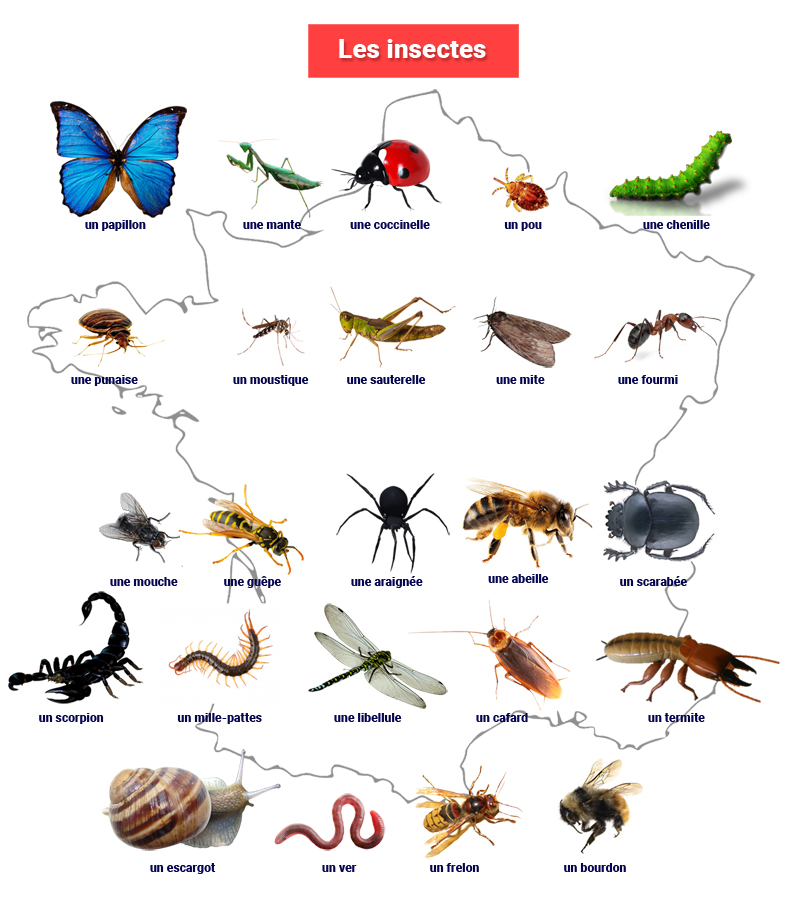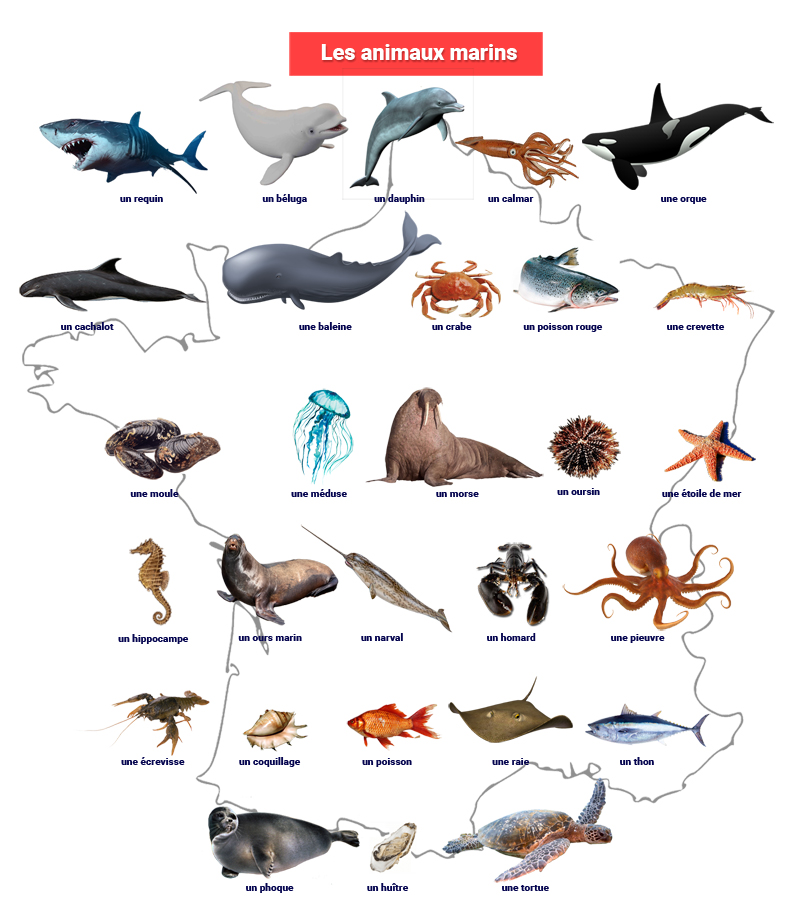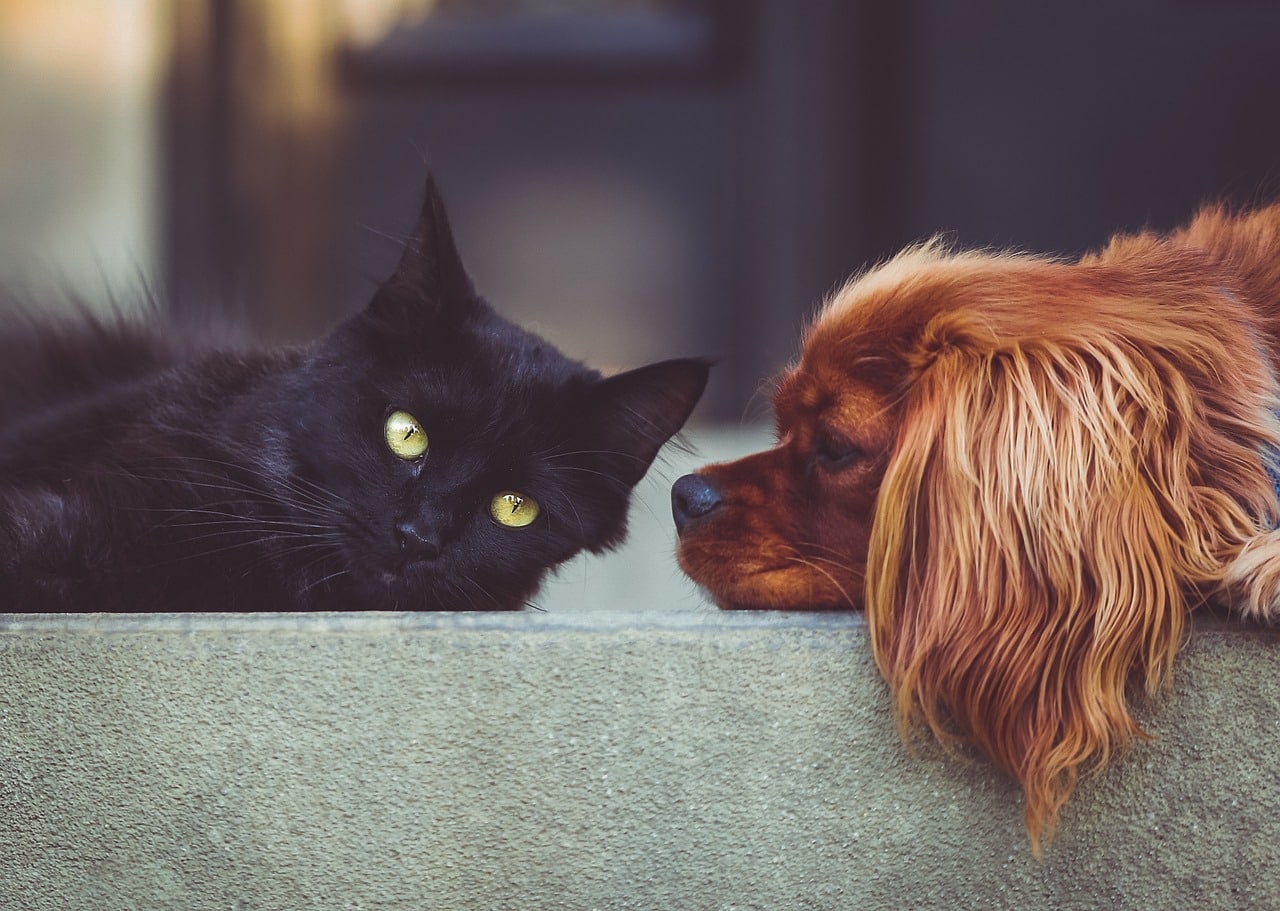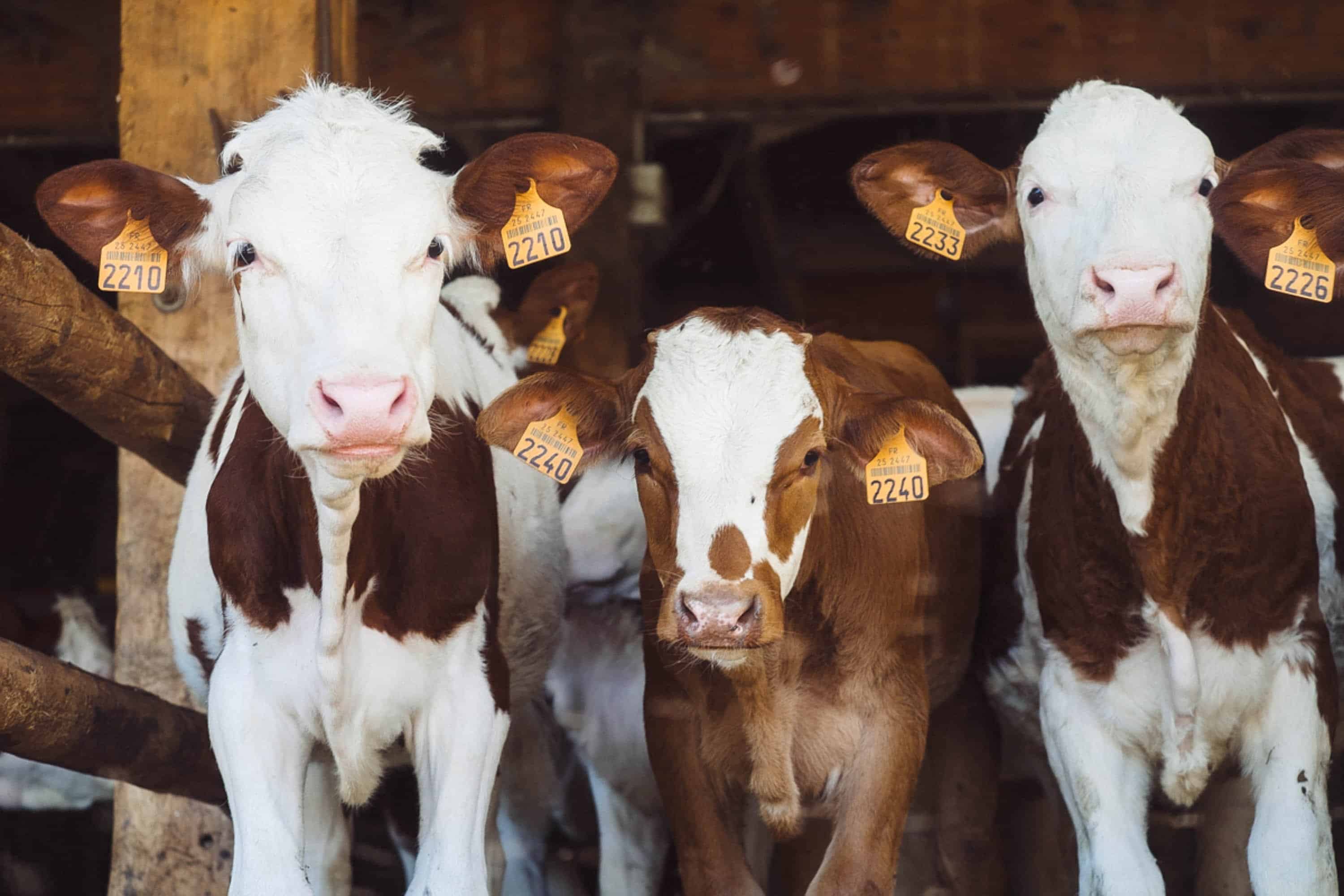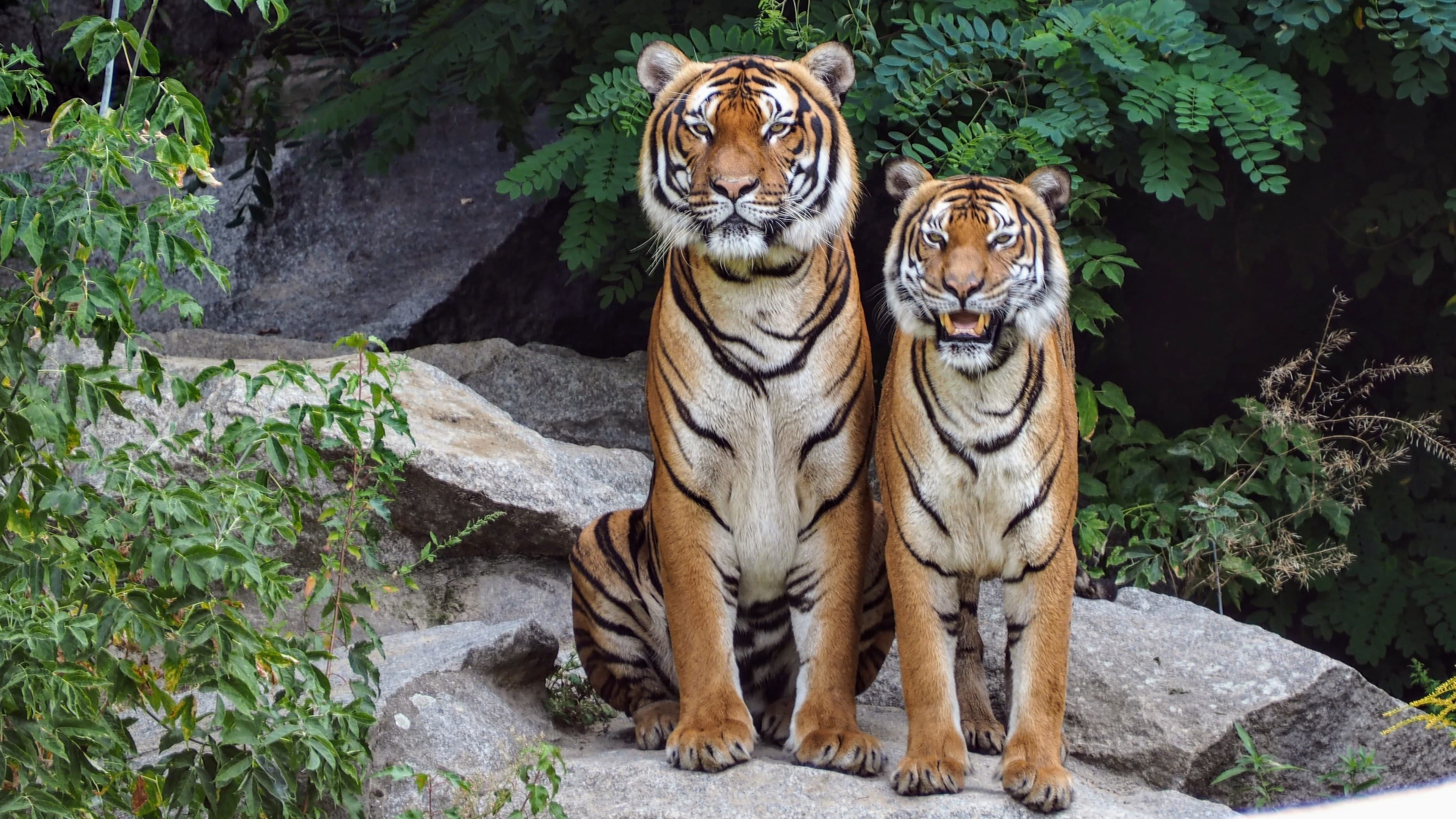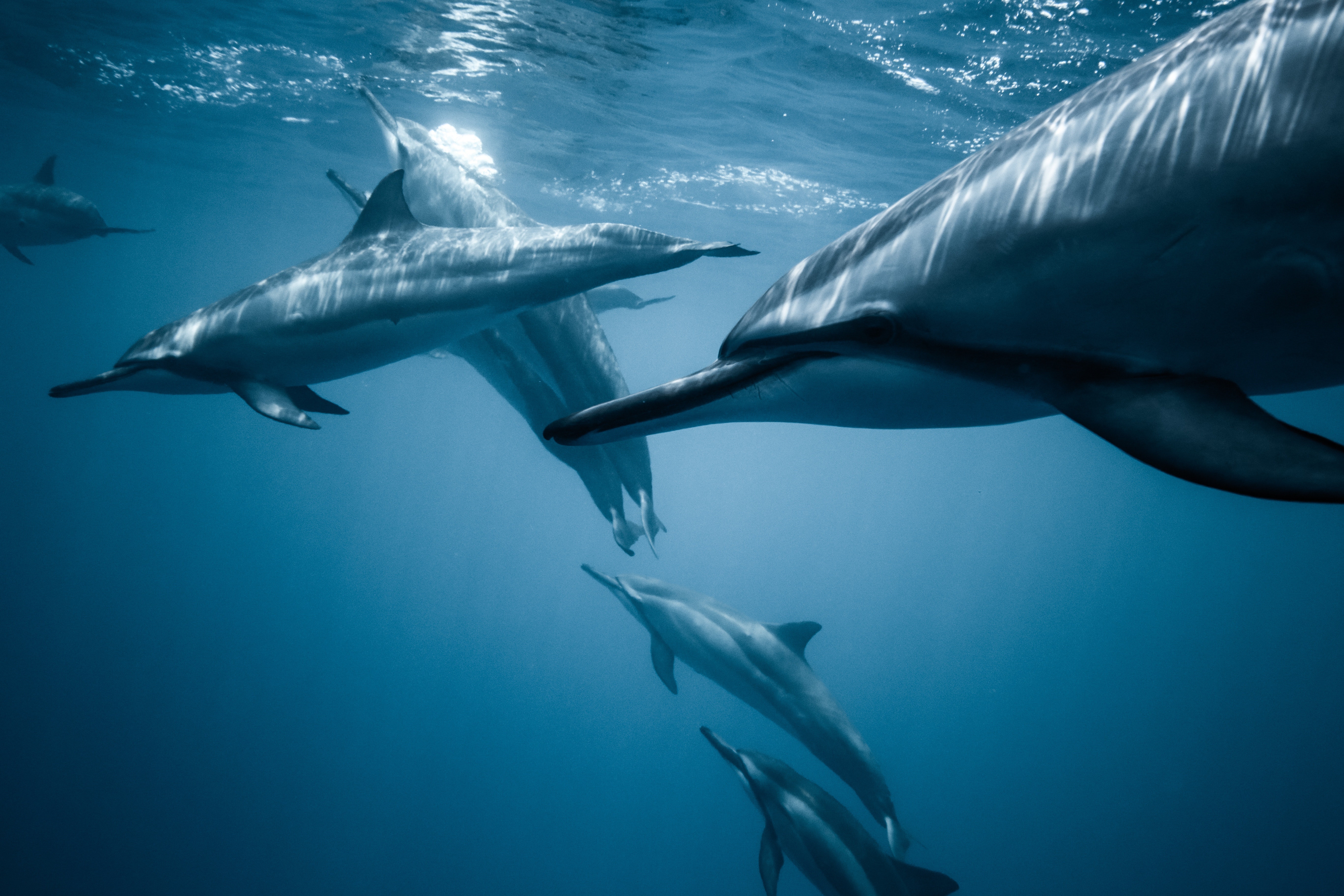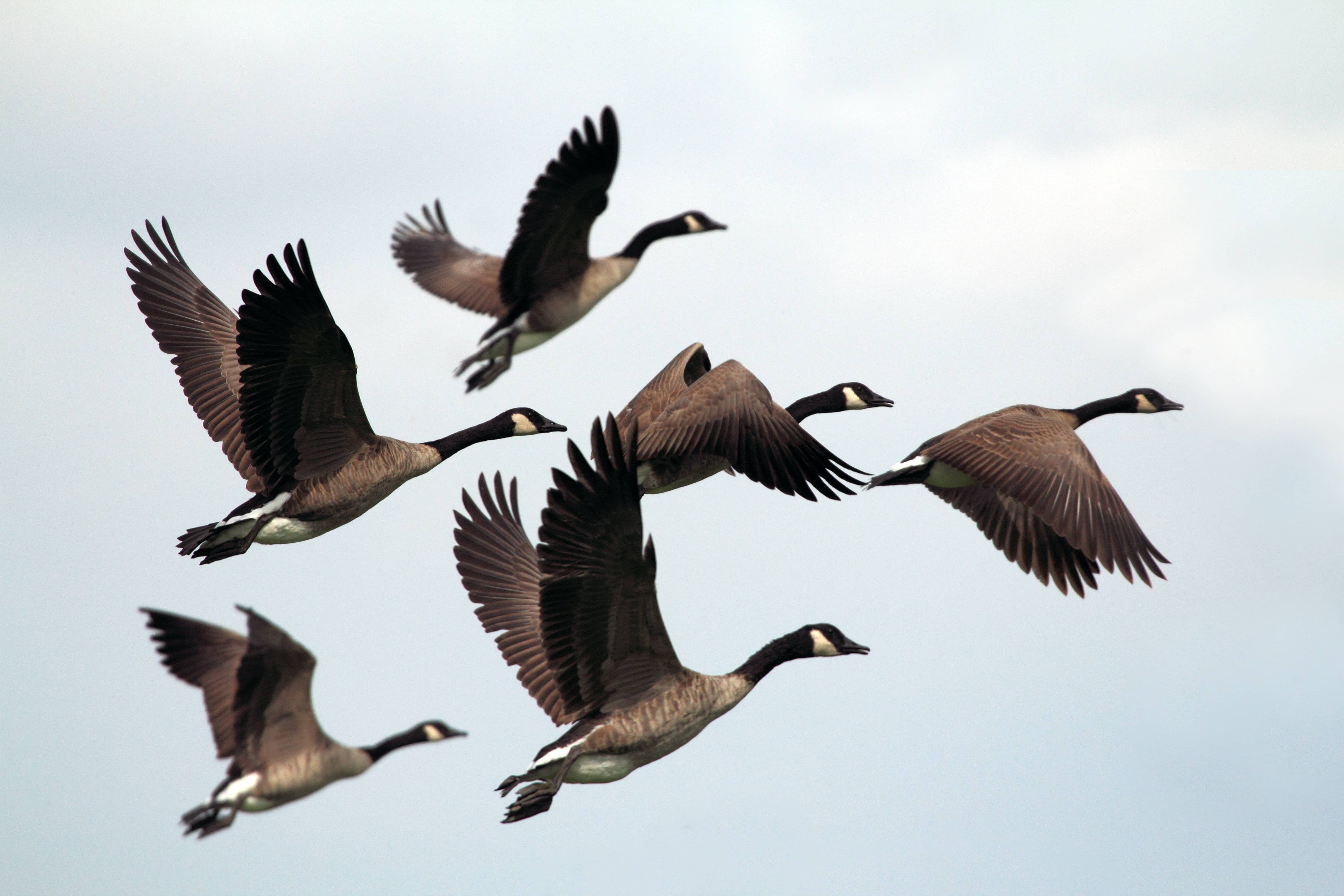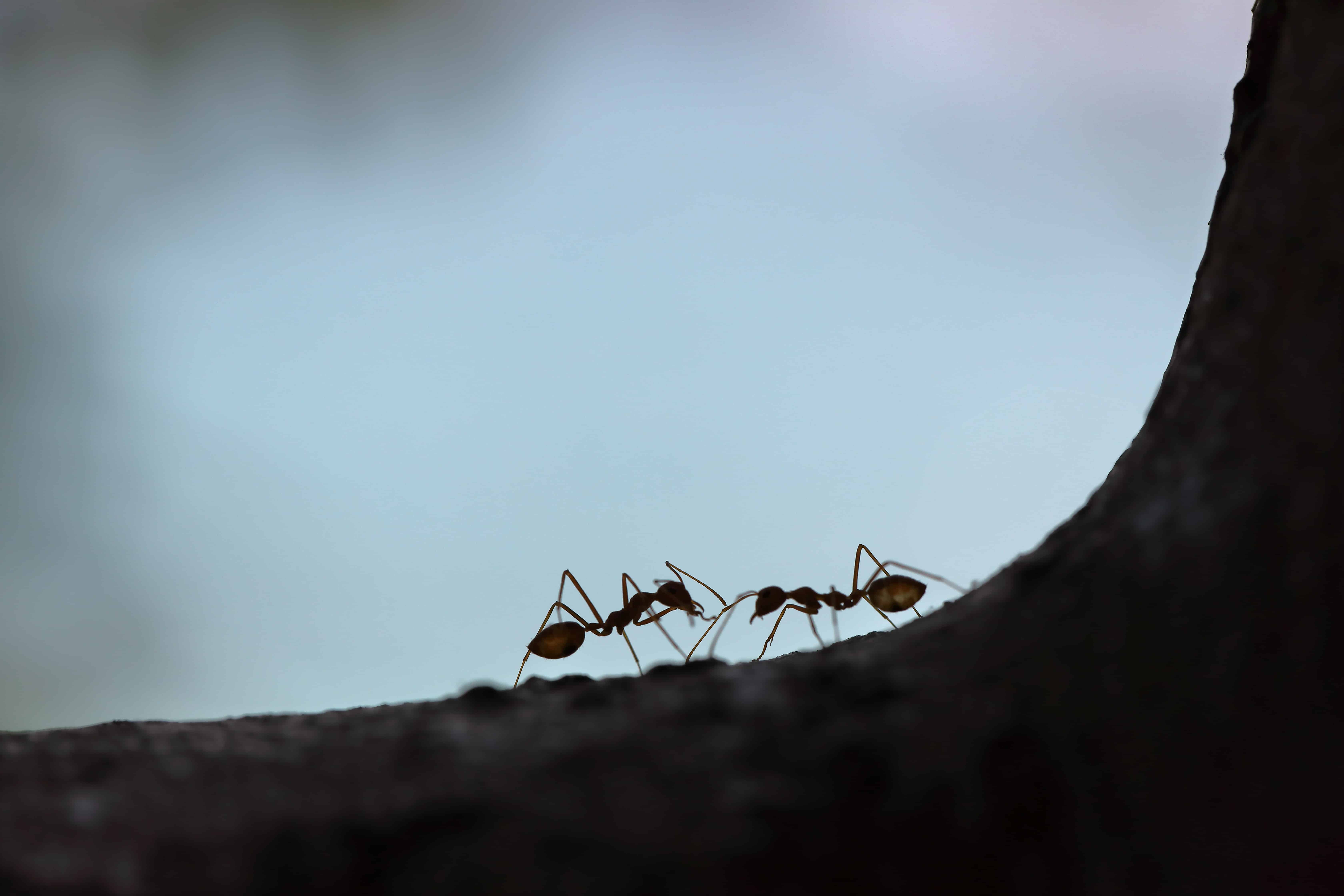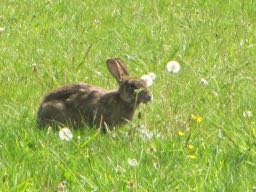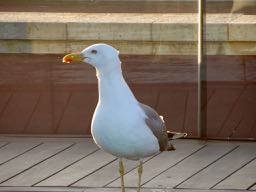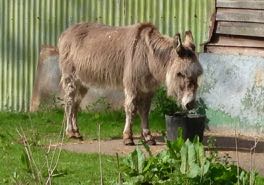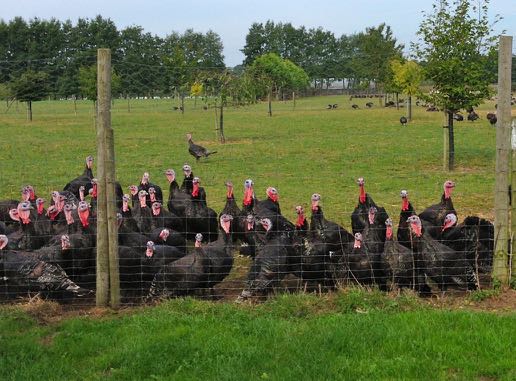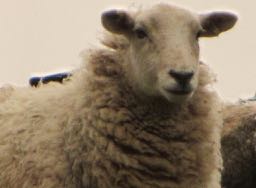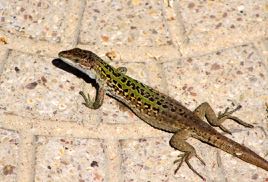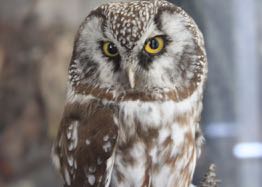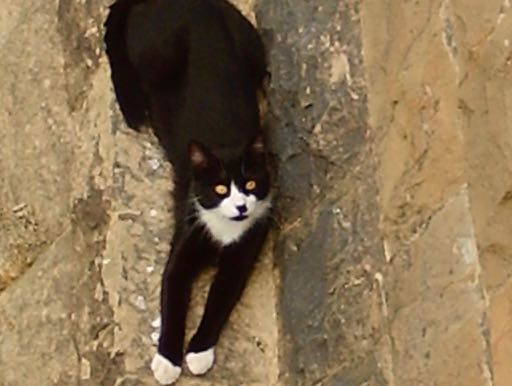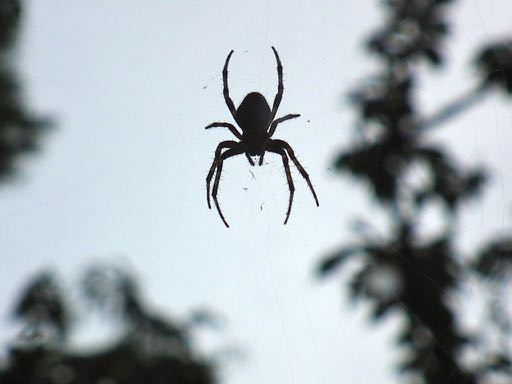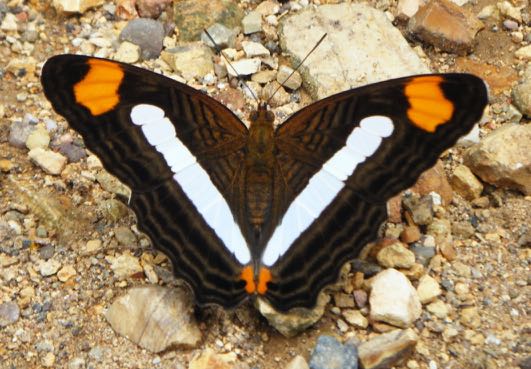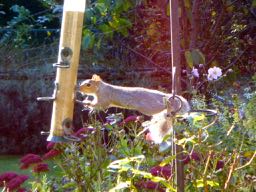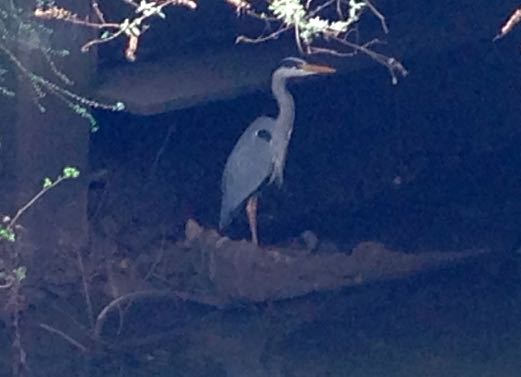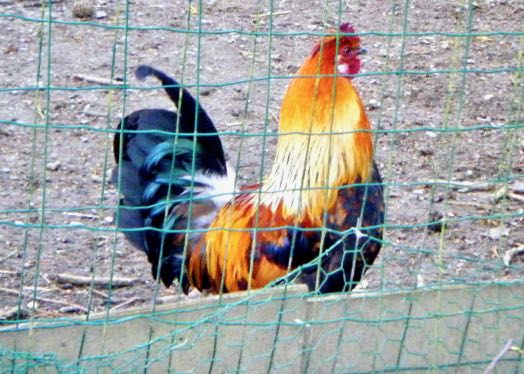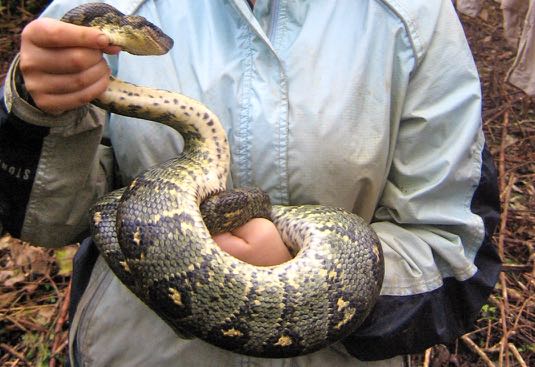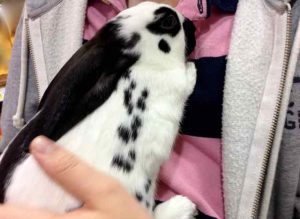На чтение 13 мин. Опубликовано 17.04.2020
Одна из самых интересных тем, которую легко и приятно изучать — это названия животных. Познания в ней значительно расширяют словарный запас и обогащают речь. Обязательно запоминайте все названия сразу с артиклем, чтобы потом грамотно употреблять их в речи.
Содержание
- Домашние животные и птицы
- Деревенские животные
- Деревенские птицы
- Дикие животные
- Птицы
- Насекомые, моллюски и др.
- Морские животные
- Другие слова, относящиеся к теме животные
- Упражнение
- Стихотворения на тему животные
- Пословицы на тему животные
Домашние животные и птицы
|
Русский язык |
Ед.ч. |
Мн.ч. |
Произношение |
|
канарейка |
une canarie |
des canaries |
юн канари/дэ канари |
|
кот |
un chat |
des chats |
ан ша/дэ ша |
|
кошка |
ne chatte |
des chattes |
юн шат/дэ шат |
|
котенок |
un chaton |
des chatons |
ан шатон/дэ шатон |
|
морская свинка |
un cavy/un cobaye |
des cavys/des cobayes |
ан кави/ан кобай |
|
мышь |
un souris |
des souris |
ан сури/дэ сури |
|
собака |
une chienne |
des chiennes |
юн шьен/дэ шьен |
|
пес |
un chien |
des chiens |
ан шья(н)/дэ шья(н) |
|
попугай |
un perroquet |
des perroquets |
ан пэрокэ/дэ пэрокэ |
|
рыба |
un poisson |
des poissons |
ан пуасон/дэ пуасон |
|
черепаха |
une tortue |
des tortues |
юн тортю/дэ тортю |
|
шиншилла |
un chinchilla |
des chinchillas |
ан шёшила/дэ шёшила |
|
щенок |
un chiot |
des chiots |
ан шио/дэ шио |
|
хомяк |
un hamster |
des hamsters |
ан амстэр/дэ замстэр |
Деревенские животные
|
Русский язык |
Ед.ч. |
Мн.ч. |
Произношение |
|
баран |
un mouton |
des moutons |
ан муто(н)/дэ муто(н) |
|
бык |
un taureau |
des taureaux |
ан торо/дэ торо |
|
жеребенок |
un poulain |
des poulains |
ан пулэ(н)/дэ пулэ(н) |
|
козел |
un bouc |
des boucs |
ан бук/дэ бук |
|
коза |
une chèvre |
des chèvres |
юн шэвр/дэ шэвр |
|
козленок |
un chevreuil |
des chevreuils |
ан шэврёй/дэ шэврёй |
|
корова |
une vache |
des vaches |
юн ваш/дэ ваш |
|
кролик |
un lapin |
des lapins |
ан лапэн/дэ лапэн |
|
лошадь/конь |
un cheval |
des chevals |
ан шеваль/дэ шеваль |
|
овца |
une brebis |
des brebis |
юн бреби/дэ бреби |
|
осел |
un âne |
des ânes |
ан ан/дэ зан |
|
ослица |
une ânesse |
des ânesses |
юн анэс/дэ занэс |
|
пони |
un poney |
des poneys |
ан понэ/дэ понэ |
|
свинья |
un porc |
des porcs |
ан пор/дэ пор |
|
свинья/поросенок |
un cochon |
des cochons |
ан кошон/дэ кошон |
|
теленок |
un veau |
des veaux |
ан во/дэ во |
|
ягненок |
un agneau |
des agneaux |
ан аньо/дэ аньо |
Деревенские птицы
|
Русский язык |
Ед.ч. |
Мн.ч. |
Произношение |
|
гусь |
un oie |
des oies |
ан уа/дэ уа |
|
индейка |
une dinde |
des dindes |
юн дэ(н)д/дэ дэ(н)д |
|
индюк |
un dindon |
des dindons |
ан дэ(н)до(н)/дэ дэ(н)до(н) |
|
курица |
une poule |
des poules |
юн пуль/дэ пуль |
|
петух |
un coq |
des coqs |
ан кок/дэ кок |
|
утка |
un canard |
des canards |
ан канар/дэ канар |
|
утенок |
un caneton |
des caneton |
ан кянтон/дэ кянтон |
|
фазан |
un faisan |
des faisans |
ан фэзан/дэ фэзан |
|
цыпленок |
un poussin |
des poussins |
ан пусэн/дэ пусэн |
Дикие животные
|
Русский язык |
Ед.ч. |
Мн.ч. |
Произношение |
|
барсук |
un blaireau |
des blaireaux |
ан блэро/дэ блэро |
|
бегемот или гиппопотам |
un hippopotame |
des hippopotames |
ан ипопотам/дэ зипопотам |
|
белка |
un écureuil |
des écureuils |
ан экюрёй/дэ зэкюрёй |
|
белый медведь |
un ours blanc |
des ours blancs |
ан ур блан/дэ зур блан |
|
бизон |
un bison |
des bisons |
ан бизон/дэ бизон |
|
буйвол |
un buffle |
des buffles |
ан бюфль/дэ бюфль |
|
верблюд |
un chameau |
des chameaux |
ан шамо/дэ шамо |
|
волк |
un loup |
des loups |
ан лу/дэ лу |
|
гепард |
un guépard |
des guépards |
ан гепар/дэ гепар |
|
гиббон |
un gibbon |
des gibbons |
ан гибон/дэ гибон |
|
горилла |
un gorille |
des gorilles |
ан горий/дэ горий |
|
ёж |
un hérisson |
des hérissons |
ан эрисо(н)/дэ зэрисо(н) |
|
енот-полоскун |
un raton laveur |
des ratons laveurs |
ан ратон лавё/дэ ратон лавё |
|
жираф |
une girafe |
des girafes |
юн жираф/дэ жираф |
|
заяц |
un lièvre |
des lièvres |
ан льевр/дэ льевр |
|
зебра |
une zèbre |
des zèbres |
юн зэбр/дэ зэбр |
|
ирбис или снежный барс |
un irbis |
des irbis |
ан ирби/дэ зирби |
|
кабан |
un sanglier |
des sangliers |
ан санглиэ/дэ санглиэ |
|
койот |
un coyote |
des coyotes |
ан койот/дэ койот |
|
крокодил |
un crocodile |
des crocodiles |
ан крокодиль/дэ крокодиль |
|
крот |
un môle |
des môles |
ан моль/дэ моль |
|
крыса |
un rat |
des rats |
ан ра/дэ ра |
|
лама |
un lama |
des lamas |
ан лама/дэ лама |
|
лев |
un lion |
des lions |
ан льо(н)/дэ льо(н) |
|
ленивец |
une paresse |
des paresses |
юн парэс/дэ парэс |
|
леопард |
un léopard |
des léopards |
ан леопар/дэ леопар |
|
летучая мышь |
une chauve-souris |
des chauves-souris |
юн шов сури/дэ шов сури |
|
лиса |
un renard |
des renards |
ан рёнар/дэ рёнар |
|
лось |
un élan |
des élans |
ан элан/дэ зэлан |
|
лягушка |
une grenouille |
des grenouilles |
юн грёнуй/дэ грёнуй |
|
медведь |
un ours |
des ours |
ан ур/дэ зур |
|
муравьед |
un fourmilier |
des fourmiliers |
ан фурмийе/дэ фурмийе |
|
носорог |
un rhinocéros |
des rhinocéros |
ан риносэро/дэ риносэро |
|
обезьяна |
un singe |
des singes |
ан сэнж/дэ сэнж |
|
олень |
un cerf |
des cerfs |
ан сэр/дэ сэр |
|
оцелот |
un ocelot |
des ocelots |
ан оцэло/дэ оцэло |
|
панда |
un panda |
des pandas |
ан панда/дэ панда |
|
пингвин |
un pingouin |
des pingouins |
ан пангуэ(н)/дэ пангуэ(н) |
|
пума |
un puma |
des pumas |
ан пума/дэ пума |
|
рысь |
un lynx |
des lynxs |
ан лэнкс/дэ лэнкс |
|
сифака (сифаки, род приматов с Мадагаскара) |
un sifaka |
des sifakas |
ан сифака/дэ сифака |
|
скунс |
une moufette |
des moufettes |
юн муфэт/дэ муфэт |
|
слон |
un éléphant |
des éléphants |
ан элефа(н)/дэ зэлефа(н) |
|
сурок |
une marmotte |
des marmottes |
юн мармот/дэ мармот |
|
тапир |
un tapir |
des tapirs |
ан тапир/дэ тапир |
|
тигр |
un tigre |
des tigres |
ан тигр/дэ тигр |
|
хорек |
un furet |
des furets |
ан фюрэ/дэ фюрэ |
|
ягуар |
un jaguar |
des jaguars |
ан жагуа/дэ жагуа |
|
ящерица |
un lézard |
des lézards |
ан лэзар/дэ лэзар |
Птицы
|
Русский язык |
Ед.ч. |
Мн.ч. |
Произношение |
|
аист |
une cigogne/ciconia |
des cigognes |
юн сигонь/дэ сигонь |
|
воробей |
un moineau |
des moineaux |
ан муано/дэ сигонь |
|
ворон |
un corbeau |
des corbeaux |
ан корбо/дэ корбо |
|
ворона |
|||
|
голубь |
un pigeon |
des pigeons |
ан пижон/дэ пижон |
|
грач |
un freux |
des freux |
ан фрё/дэ фрё |
|
гриф |
un vautour |
des vautours |
ан вотур/дэ вотур |
|
зеленый дятел |
un pivert |
des piverts |
ан пивэр/дэ пивэр |
|
колибри |
un colibri |
des colibris |
ан колибри/дэ колибри |
|
ласточка |
une hirondelle |
des hirondelles |
юн ирондэль/дэ зирондэль |
|
лебедь |
un cygne |
des cygnes |
ан синь/дэ синь |
|
орел |
un aigle |
des aigles |
ан эгьль/дэ зэгьль |
|
павлин |
un paon |
des paons |
ан пан/дэ пан |
|
пеликан |
un pélican |
des pélicans |
ан пеликэн/дэ пеликэн |
|
перепел |
une caille |
des cailles |
юн кяй/дэ кяй |
|
синица |
une mésange |
des mésanges |
юн мэсанж/дэ мэсанж |
|
снегирь |
un bouvreuil |
des bouvreuils |
ан буврой/дэ буврой |
|
сова |
un hibou |
des hiboux |
ан ибу/дэ зибу |
|
страус |
une autruche |
des autruches |
юн отрюш/дэ зотрюш |
|
фламинго |
un flamant |
des flamants |
ан фламан/дэ фламан |
|
чайка |
une mouette |
des mouettes |
юн муэт/дэ муэт |
|
ястреб |
un faucon |
des faucons |
ан фокон/дэ фокон |
Насекомые, моллюски и др.
|
Русский язык |
Ед.ч. |
Мн.ч. |
Произношение |
|
бабочка |
un papillon |
des papillons |
ан папилон/дэ папилон |
|
богомол |
une mante |
des mantes |
юн мант/дэ мант |
|
божья коровка |
une coccinelle |
des coccinelles |
юн коксинэль/дэ коксинэль |
|
вошь |
un pou |
des poux |
ан пу/дэ пу |
|
гусеница |
une chenille |
des chenilles |
юн шэний/дэ шэний |
|
клоп |
une punaise |
des punaises |
юн пюнэз/дэ пюнэз |
|
комар |
un moustique |
des moustiques |
ан мустик/дэ мустик |
|
кузнечик |
une sauterelle |
des sauterelles |
юн сотрэль/дэ сотрэль |
|
моль |
une mite |
des mite |
юн мит/дэ мит |
|
муравей |
une fourmi |
des fourmis |
юн фурми/дэ фурми |
|
муха |
une mouche |
des mouches |
юн муш/дэ муш |
|
оса |
une guêpe |
des guêpes |
юн гуэп/дэ гуэп |
|
паук |
une araignée |
des araignées |
юн арэнье/дэ зарэнье |
|
пчела |
une abeille |
des abeilles |
юн абей/дэ забей |
|
скарабей |
un scarabée |
des scarabées |
ан скарабэ/дэ скарабэ |
|
скорпион |
un scorpion |
des scorpions |
ан скорпион/дэ скорпион |
|
сороконожка |
un mille-pattes |
des mille-pattes |
ан миль пат/дэ миль пат |
|
стрекоза |
une libellule |
des libellules |
юн либэлюль/дэ либэлюль |
|
таракан |
un cafard |
des cafards |
ан кафар/дэ кафар |
|
термит |
un termite |
des termites |
ан термит/дэ термит |
|
улитка |
un escargot |
des escargots |
ан эскарго/дэ зэскарго |
|
червяк |
un ver |
des vers |
ан вэр/дэ вэр |
|
шершень |
un frelon |
des frelons |
ан фрэлон/дэ фрэлон |
|
шмель |
un bourdon |
des bourdons |
ан бурдо(н)/дэ бурдо(н) |
Морские животные
|
Русский язык |
Ед.ч. |
Мн.ч. |
Произношение |
|
акула |
un requin |
des requins |
ан рёкан/дэ рёкан |
|
белуга |
un béluga |
des bélugas |
ан белуга/дэ белуга |
|
дельфин |
un dauphin |
des dauphins |
ан дофан/дэ дофан |
|
кальмар |
un calmar |
des calmars |
ан кальма/дэ кальма |
|
касатка |
une orque |
des orques |
юн оркь/дэ зоркь |
|
кашалот |
un cachalot |
des cachalot |
ан кашалё/дэ кашалё |
|
кит |
une baleine |
des baleines |
ан бален/дэ бален |
|
краб |
un crabe |
des crabes |
ан краб/дэ краб |
|
красная рыба |
un poisson rouge |
des poissons rouges |
ан пуасон руж/дэ пуасон руж |
|
креветка |
une crevette |
des crevettes |
юн крэвэт/дэ крэвэт |
|
мидия |
une moule |
des moules |
юн муль/дэ муль |
|
медуза |
une méduse |
des méduses |
юн мэдуз/дэ мэдуз |
|
морж |
un morse |
des morses |
ан морс(э)/дэ морс(э) |
|
морской ёж |
un oursin |
des oursins |
ан урсэн/дэ зурсэн |
|
морская звезда |
une étoile de mer |
des étoiles de mer |
юн этуаль дё мэр/дэ зэтуаль дё мэр |
|
морской конек |
un hippocampe |
des hippocampes |
ан ипокамп/дэ зипокамп |
|
морской котик |
un ours marin |
des ours marins |
ан ур марин/дэ зур марин |
|
нарвал |
un narval |
des narvals |
ан нарваль/дэ нарваль |
|
омар |
un homard |
des homards |
ан омар/дэ зомар |
|
осьминог |
une pieuvre |
des pieuvres |
юн пьёвр/дэ пьёвр |
|
рак |
une écrevisse |
des écrevisses |
юн экрэвис/дэ зэкрэвис |
|
ракушка |
un coquillage |
des coquillages |
ан кокияж/дэ кокияж |
|
рыба |
un poisson |
des poissons |
ан пуасон/дэ пуасон |
|
скат |
une raie |
des raies |
юн рэ/дэ рэ |
|
тунец |
un thon |
des poissons |
ан тон/дэ тон |
|
тюлень |
un phoque |
des phoques |
ан фокь/дэ фокь |
|
устрица |
un huître |
des huîtres |
ан уитр/дэ зуитр |
|
черепаха |
une tortue |
des tortues |
юн тортю/дэ тортю |
Другие слова, относящиеся к теме животные
|
Русский язык |
Ед.ч. |
Мн.ч. |
Произношение |
|
всеядный (прил. и сущ.) |
(un) omnivore |
-, des omnivores |
(ан) омнивор/дэ зомнивор |
|
дикий (прил.) |
sauvage |
— |
соваж |
|
домашний (прил.) |
domestique |
— |
доместикь |
|
животное |
un animal |
des animaux |
ан анималь/дэ занимо |
|
крыло |
une aile |
des ailes |
юн эль/дэ з эль |
|
кусать |
mordre |
— |
мордр |
|
лаять |
aboyer |
— |
абое |
|
млекопитающее (прил. и сущ.) |
(une) mammifère |
-, des mammifères |
юн мамифэр/дэ мамифэр |
|
мычать |
mugir |
— |
мужир |
|
мяукать |
miauler |
— |
мёолэ |
|
насекомое |
un insecte |
des insectes |
ан инсэкт/дэ зинсэкт |
|
преданный |
fidèle |
— |
фидэль |
|
полосатый |
rayé |
— |
рае |
|
рептилия |
un reptile |
des reptiles |
ан рэптиль/дэ рэптиль |
|
травоядное животное (сущ.) |
un herbivore |
des herbivores |
ан эрбивор/дэ зэрбивор |
|
царапать |
griffer |
— |
грифэ |
Упражнение
Рассмотрите картинки с животными на карточках и назовите их (скачать их можно ниже). Можно развернуто рассказать, где живет каждое животное.
Вы можете скачать карточки с фотографиями и названиями разных зверей:
- Домашние животные.
- Дикие животные: часть 1, 2, 3.
- Деревенские животные.
- Морские животные.
- Деревенские птицы.
- Птицы.
- Насекомые.
Стихотворения на тему животные
Названия животных удобно учить в стихотворной форме. Вот несколько стихотворений для запоминания слов:
Petit lapin blanc
Tu joues avec ta maman
Toi petit lapin blanc
Tu t’appelles Pampan
Pim-pom, pim-pom, au feu !
La maison de la chèvre brûle !
La chèvre bondit effarée,
Les deux yeux écarquillés.
La poule court avec un seau d’eau,
Vite, vite de l’eau, de l’eau,
Le chat s’accroche à la cloche,
Au secours venez, venez,
Toute la maison va brûler !
Le coq entend son appel,
Il accourt avec l’échelle,
le chien tire le long tuyau,
Ouah ! qui m’aidera à pomper l’eau ?
Le canard sort de la mare,
Me voilà, coin, coin je viens !
Au feu ! Au feu! Pim-pom, Pim-pom,
Chèvre nous sauverons ta maison,
Quand les pompiers sont arrivés,
tout était terminé,
Et devant sa maison inondée,
La chèvre dormait rassurée,
Après toutes ces aventures.
Que dit le lapin ? Dit-il qu’il a faim ?
Dis-moi lapin, manges-tu du pain ?
Dis-moi cheval, vas-tu au bal ? As-tu le moral ?
Dis-moi tortue, qu’as-tu donc vu ?
Dis-moi souris, t’appelles-tu Mélanie ?
Dis-moi, baleine, est-ce que ça baigne ?
Quelle heure est-il, monsieur le crocodile?
Il est trois heures moins le quart, ma chère Odile!
Hé oui! C’est le crocodile César!
C’est un reptile assez bizarre.
Figurez-vous qu’il sait lire l’heure!
Et il mange aussi du chou-fleur!
Il n’a jamais eu de petits,
Mais c’est un gentil ami.
Пословицы на тему животные
| Пословица | Перевод | Значение |
| À bon chat, bon rat. | Хорошей кошке хорошая крыса. | Так говорят, когда нападающий находит того, кто может ему противостоять. |
| À brebis tondue, Dieu mesure le vent. | По подстриженным овцам Бог измеряет ветер. | Испытания, которые нам навязывают, соразмерны нашим силам. |
| À chaque oiseau son nid est beau. | Для каждой птицы ее гнездо — лучшее. | Каждый находит красивым то, что принадлежит ему. |
| Appeler un chat un chat. | Называть кота котом. | Называть вещи своими именами. |
| Avoir un chat dans la gorge. | Иметь кота в горле. | Охрипнуть, не мочь ни говорить, ни петь. |
| Bon chien chasse de race. | Хорошая порода не может не проявиться. | Дети наследуют качества или недостатки своих родителей. |
| Chat échaudé craint l’eau froide. | Тот кот боится холодной воды, который однажды в нее окунулся. | Нужно учиться на своих ошибках. |
| Chien en vie vaut mieux que lion mort. | Живой пес лучше мертвого льва. | Жизнь — главное сокровище. |
| Chien qui aboie ne mord pas. | Злая собака не кусает. | Тот, кто кричит много, мало делает. |
| Donner un œuf pour avoir un bœuf. | Дать яйцо, чтобы получить говядину. | Сделать небольшую услугу для того, чтобы получить большую. |
Pets and animals in French
Les animaux domestiques
- un chien = a dog
- un chat = a cat
- un lapin = a rabbit
- une tortue = a turtle
- un hamster = a hamster
- un poisson rouge = a goldfish
- une souris = a mouse
- un canari = a canary
- un perroquet = a parrot
Les animaux de la ferme
- une vache = a cow
- un mouton = a sheep
- un cheval = a horse
- une poule = a hen
- un coq = a rooster
- un canard = a duck
- un cochon = a pig
- un âne = a donkey
- une chèvre = a goat
Les animaux de la forêt
- un renard = a fox
- un écureuil = a squirrel
- un lièvre = a hare
- un loup = a wolf
- un oiseau = a bird
- un hibou = an owl
- un sanglier = a wild boar
- un cerf = a stag, deer
- un hérisson = a hedgehog
With a Premium Membership, you will also learn about:
- Les animaux de la jungle
- Les animaux de la savane
- Les animaux du désert
- Les animaux marins
- Les animaux d’Australie
- Les oiseaux
✨ Continue to enjoy the Free Infographics or become a Member and get access to more than 1,200 infographics with no watermarks!
✨ The Basic and Premium Memberships offer a more qualitative content with more advanced infographics compared to those offered free of charge.
✨ The Membership’s library is only available to Basic and Premium Members!
28 Comments
-
WOW SO AWESOME MERCY CUP & FRENCH GOD BLESS AND CONTINUE KEEP UP THE GOOD WORK.AM TEN YEARS OLD.
-
Bonjour Imelda, merci pour ton message !
Good luck on your French learning journey 🙂-
Help me please with. My french exams
-
Hi, I cannot help you more than all the content I give for free both on my website and on my social media, but I hope this will help you a bit on your French learning journey! Bonne chance avec les examens 🙂
-
-
-
help me please,i want to known how to speak french
-
You can read my blog articles that will give you advices on how to learn and improve your French and you can follow me on my social media (Instagram, Facebook, TikTok, Pinterest, YouTube) where I give free lessons. Good luck on you French learning journey 🙂
-
-
-
PLEASE COULD YOU COME TO NIGERIA TO TEACH US FRENCH?????
-
That’s a bit too far away from where I live, but I hope my site can help you a bit on the way 🙂
You can also check my Instagram or Facebook accounts where I post a lot of free resources 😉
-
-
Thank you soooo much, I have my french test tomorrow and really your site is lit!! Its very helpful!!! Thank you
<3333333333333-
Avec plaisir 🙂 I hope your test went well!
-
-
Good French resources center for the beginning learners all the world.
-
Merci 🙂
-
-
omg! thanks a lot you saved me and my french grade’s
THANK’S A LOT-
Glad I could help 🙂
-
how do they say the fruits in french?
-
Les infographies sur les fruits ne sont visibles qu’avec l’abonnement Premium, mais j’ai publié quelques infographies sur les fruits que vous pouvez voir sur Instagram, Facebook ou Pinterest 🙂
-
fruit
-
Les infographies sur les fruits ne sont visibles qu’avec l’abonnement Premium, mais j’ai publié quelques infographies sur les fruits que vous pouvez voir sur Instagram, Facebook ou Pinterest 🙂
-
-
-
-
-
thankyou for your lesson ,they help alot learning french words
-
Avec plaisir 🙂
-
-
Tysm…. Can you also make a list on education in France pls.
-
I’ve made several infographics about the French school system that you can find on Instagram or Facebook.
-
-
You from Europe?
-
It’s obvious from the sending time of the comments 😃
-
France?
-
Yes, I’m French 🙂
-
-
Hi you help me pass my test thanks and am from Nigeria bye bye (hhduhhffgjhgdgh)
-
Félicitations 🙂
-
Post a comment:
un animal (m) — [animal] — животное
Домашние животные
un chat (m) — [ʃa] — кот
un chien (m) — [ʃjɛ̃] — собака
une souris (f) — [suʁi] — мышь
un canard (m) — [kanaʁ] — утка/селезень
un veau (m) — [vo] — телёнок
une vache (f) — [vaʃ] — корова
une poule (f) — [pul] — курица
un lapin (m) — [lapɛ̃] — кролик
un cheval (m) — [ʃəval] — конь
un taureau (m) — [tɔʁo] — бык
un mouton (m) — [mutɔ̃] — баран
Дикие животное
un tigre (m) — [tiɡʁ] — тигр
un loup (m) — [lu] — волк
un ours (m) — [uʁs] — медведь
un renard (m) — [ʁənaʁ] — лиса
un chameau (m) — [ʃamo] — верблюд
un éléphant (m) — [elefɑ̃] — слон
un singe (m) — [sɛ̃ʒ] — обезьяна
un serpent (m) — [sɛʁpɑ̃] — змея
un perroquet (m) — [peʁɔkɛ] — попугай
Морские животные
une tortue (f) — [tɔʁty] — черепаха
un poisson (m) — [pwasɔ̃] — рыба
un dauphin (m) — [dofɛ̃] — дельфин
une baleine (f) — [balɛn] — кит
un requin (m) — [ʁəkɛ̃] — акула
Насекомые
une mouche (f) — [muʃ] — муха
une araignée (f) — [aʁeɲe] — паук
un papillon (m) — [papijɔ̃] — бабочка
un escargot (m) — [ɛskaʁɡo] — улитка
une abeille (f) — [abɛj] — пчела
Глаголы по теме
aboyer — [abwaje] — лаять
miauler — [mjole] — мяукать
mugir — [myʒiʁ] — мычать
griffer — [ɡʁife] — царапать
m — masculin — слово мужского рода
f — féminin — слово женского рода
Посмотрите видео ниже, чтобы услышать произношение лексики на французском.
No matter how old you are, animal vocabulary in French is both useful and fun to learn. It’s a common topic of interest, as many French people are animal lovers. According to recent statistics, one French household out of two owns at least one animal domestique (pet). Another proof of this undying love is the popular TV show 30 millions d’amis (30 million friends) that used to present reports on animals every week. Having aired for 40 years from 1976 to 2016, it is one of the longest-running French TV shows ever made.
With that in mind, let’s learn some of the most common animal vocabulary in French:
- A note on grammar for French animal vocabulary
- 1. Pets
- 2. Farm animals
- 3. Forest animals
- 4. Jungle animals
- 5. Sea animals
- 6. Birds
- 7. Bonus: 12 French expressions containing animal vocabulary
Start your 7-day free trial
A note on grammar for French animal vocabulary
Before we enter the vocabulary of the animal kingdom, there are a few grammar rules to keep in mind. Similar to adjectives, certain words for animals in French have a masculine form and a feminine form. For instance, un chien is a male dog while une chienne is a female dog. Other animals in our vocabulary lists have two completely different words according to their genders, such as un cheval (horse) and une jument (mare).
Finally, in a strange case of French grammar defying biology, some French words for animals only have one form, and therefore one gender. This is why un hamster is always male whereas une souris (mouse) is always female.
In our lists, when relevant and commonly used, we have mentioned both the male and female words for the different animals. Now, let’s move along to some animal vocab.
1. Pets
Talking about your favorite animal domestique (pet), also known as animal de compagnie, is an easy topic to break the ice. It’s as safe a subject as talking about the weather, but also an opportunity to tell more about yourself and your home life. Here are a few common French pet names (pun intended!):
- Un canari >> canary
- Un chat (feminine: une chatte) >> cat
- Un chien (feminine: une chienne) >> dog
- Un hamster >> hamster
- Un lapin (feminine: une lapine) >> rabbit
- Un perroquet >> parrot
- Un poisson rouge >> goldfish
- Une souris >> mouse
- Une tortue >> turtle
2. Farm animals
If you consider taking a quiet holiday in the French countryside or going for a hike to enjoy the landscape, you may want to consider booking a room in a gîte à la ferme (a farm cottage). This is a great way to discover rural France, as well as its local products and traditions. Of course, you are likely to see a few of the following animaux de la ferme (farm animals) along the way:
- Un âne (feminine: une ânesse) >> donkey
- Un canard >> duck
- Un cheval >> horse
- Une chèvre >> goat
- Un cochon >> pig
- Un coq >> rooster
- Une dinde >> turkey
- Une jument >> mare
- Un mouton >> sheep
- Une poule >> hen
- Un taureau >> bull
- Une truie >> sow
- Une vache >> cow
3. Forest animals
If you are already in the countryside, you may even be lucky enough to see a few animaux de la forêt (forest animals), such as:
- Une biche >> hind
- Un castor >> beaver
- Un cerf >> stag
- Un daim >> deer
- Un écureuil >> squirrel
- Un hérisson >> hedgehog
- Un lièvre >> hare
- Un loup (feminine: une louve) >> wolf
- Une loutre >> otter
- Un ours >> bear
- Un porc-épic >> porcupine
- Un raton-laveur >> raccoon
- Un renard (feminine: une renarde) >> fox
- Un sanglier >> boar
Start your 7-day free trial
4. Jungle animals
You don’t have to go all the way to a faraway jungle to need this type of vocabulary. A simple trip to the zoo (or such movies as Madagascar) will be the perfect opportunity to test your knowledge of the following words for the animaux de la jungle (jungle animals):
- Une antilope >> antelope
- Un chameau >> camel
- Un crocodile >> crocodile
- Un éléphant >> elephant
- Une girafe >> giraffe
- Un guépard >> cheetah
- Un hippopotame >> hippopotamus
- Une hyène >> hyena
- Un léopard >> leopard
- Un lion >> lion
- Un rhinocéros >> rhinoceros
- Un singe >> monkey
- Un tigre >> tiger
- Un zèbre >> zebra
5. Sea animals
After the zoo, time to go to the aquarium! There is much more under the sea than just a couple of goldfish, so let’s review the French words for some of the most well known animaux marins (sea animals):
- Une anguille >> eel
- Une baleine >> whale
- Un calamar >> squid
- Un crabe >> crab
- Une crevette >> shrimp
- Un dauphin >> dolphin
- Une étoile de mer >> starfish
- Un hippocampe >> seahorse
- Un homard >> lobster
- Une méduse >> jellyfish
- Un morse >> walrus
- Un phoque >> seal
- Une pieuvre >> octopus
- Un pingouin >> penguin
- Un poisson >> fish
- Une otarie >> sea lion
- Un requin >> shark
6. Birds
Wherever you are, even in urban environments, you only need to raise your eyes towards the sky to see a few oiseaux (birds). If you do, you may even be able to identify some of the following species:
- Un aigle >> eagle
- Une colombe >> dove
- Un corbeau >> crow
- Un cygne >> swan
- Un faucon >> falcon
- Un hibou >> owl
- Un moineau >> sparrow
- Une mouette >> seagull
- Une perdrix >> partridge
- Une pie >> magpie
- Un pigeon >> pigeon
- Un pivert >> woodpecker
- Un rouge-gorge >> robin
- Un vautour >> vulture
7. Bonus: 12 French expressions containing animal vocabulary
Beyond the natural world, animals are often used in figurative turns of phrases, including for nicknames and insults in French. Here are 12 of the most common ones, with their literal translation and their actual meaning in English.
| French expressions | Literal translation | Actual meaning |
| Avoir d’autres chats à fouetter | To have other cats to whip | To have other fish to fry |
| Avoir la chair de poule | To have the hen flesh | To have goosebumps |
| Avoir du chien | To have some dog | To have charm |
| Être comme un poisson dans l’eau | To be like a fish in water | To be comfortable in a situation |
| Faire le singe | Do the monkey | To monkey around |
| Faire un froid de canard | To do a duck’s cold | To be freezing cold |
| Noyer le poisson | To drown the fish | To muddy the waters/cloud the issue |
| Passer du coq à l’âne | To go from the rooster to the donkey | To jump from one topic to another |
| Poser un lapin à quelqu’un | To put a rabbit to someone | To stand someone up |
| Quand les poules auront des dents | When hens have teeth | When pigs will fly |
| Quand on parle du loup | Speaking of the wolf | Speaking of the devil |
| Rire comme une baleine | To laugh like a whale | To roar with laughter |
Use our lists to extend your animal vocabulary in French
It’s time to use your mémoire d’éléphant (elephant’s memory) to learn a few words for animals in French. Our lists may not be exhaustive, but they do include all the more common animals, broken down according to their category or environment. Make your life easier by learning one list at a time and, once you feel confident you have fully memorized it, move to the next one.
Start your 7-day free trial
Anne-Lise is a translator and copywriter working for various industries, such as hospitality and travel, as well as health and well-being. Settled down in London since the end of her university years, she cannot get enough of the exceptional cultural life in the English capital city, starting with theater, be it to see a new West End show or to roll up her sleeves with her amateur drama group. She is also interested in photography, as her Instagram profile shows. She indulges her passion for languages in a translation blog she writes with other linguist friends. Go to her Linkedin page to know more about her background and her professional experience.
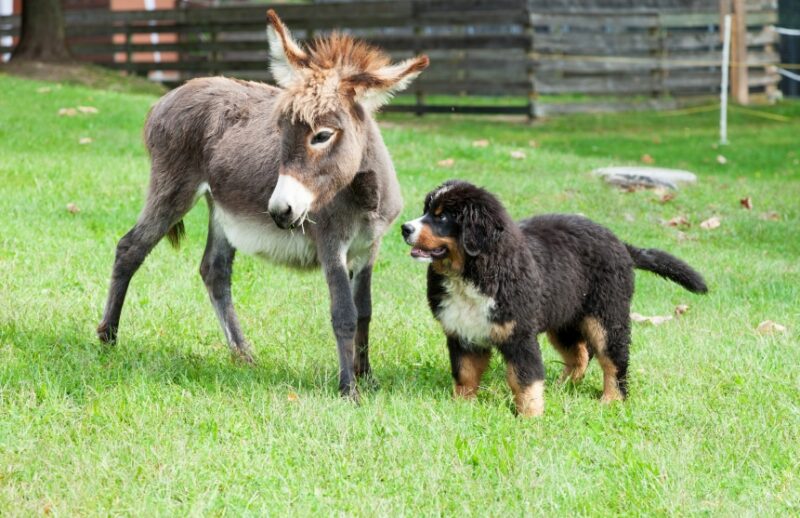
By
Last updated:
January 30, 2023
If you’re learning French, les animaux (animals) have to be part of that process, too.
Luckily, learning the names of some of the world’s creatures is one of the more fun activities in any language!
Plus, many animal names in French have a variety of meanings beyond the simple and literal.
In this post, we’ll learn a whole herd of French animal names and provide places you can practice using them.
Contents
- Les animaux domestiques — Pets
- Les animaux de la ferme — Farm animals
- Les animaux sauvages — Wild animals
- Les animaux marins — Sea animals
- Les oiseaux — Birds
- Les insectes — Insects
- A Quick Note on Gender
- Resources for Practicing Your French Animal Vocabulary
Download:
This blog post is available as a convenient and portable PDF that you
can take anywhere.
Click here to get a copy. (Download)
Les animaux domestiques — Pets
un chien — a dog
un chat — a cat
The feminine versions of the nouns for dog and cat are chienne and chatte.
However, these both have meanings that are potentially offensive or naughty-sounding depending on context, which you can probably figure out based on similar versions that exist in English.
un cochon d’Inde — a guinea pig
un hamster — a hamster
un lapin — a rabbit
un poisson rouge — a goldfish
un poisson tropical — a tropical fish
un triton — a newt
une tortue — a turtle
un perroquet — a parrot
une perruche — a parakeet
un cacatoès — a cockatoo
une colombe — a dove
un canari — a canary
Les animaux de la ferme — Farm animals
un cochon — a pig
A pig can also be called un porc, and a sow is une truie.
un cheval — a horse
Be careful not to mix up the plural for cheval, chevaux, with the word for hair, which is cheveux.
un étalon — a stallion
une jument — a mare
une vache — a cow
Vache and variations on it practically make up their own subcategory of French slang and colloquialisms. La vache! is an expression used to express surprise. It’s sort of equivalent to “wow” or “damn” in English.
un taureau — a bull
un poulet — a chicken
une poule — a hen
un coq — rooster
un mouton — a sheep
un agneau — a lamb
une chèvre — a goat
Chèvre can also refer to goat’s cheese, but when this happens, it takes on the properties of a masculine noun.
un âne — a donkey
une mule — a mule
Les animaux sauvages — Wild animals
un écureuil — a squirrel
un blaireau — a badger
un tamia — a chipmunk
French Canadians have their own special word for chipmunks, un suisse, which literally means “a Swiss” and may have to do with how chipmunks’ stripes resemble the uniforms of the Vatican’s Swiss Guard.
une souris — a mouse
As in English, this word can also refer to a computer mouse.
un rat — a rat
un furet — a ferret
un hérisson — a hedgehog
un renard — a fox
un cerf — a stag
une biche — a doe (deer)
un ours — a bear
un loup — a wolf
une girafe — a giraffe
un éléphant — an elephant
un lion — a lion
un tigre — a tiger
un guépard — a cheetah
un babouin — a baboon
un gorille — a gorilla
un singe — a monkey
un chimpanzé — a chimpanzee
un zèbre — a zebra
un serpent — a snake
un gecko — a gecko
un lézard — a lizard
une grenouille — a frog
un crapaud — a toad
une loutre — an otter
un alligator — an alligator
un crocodile — a crocodile
Les animaux marins — Sea animals
un poisson — a fish
des fruits de mer — shellfish (as food)
Literally, “fruits of [the] sea.”
un mollusque — a mollusk
une moule — a mussel
une huître — an oyster
une palourde — a clam
un homard — a lobster
un escargot — a snail
un crabe — a crab
une coquille Saint-Jacques — a scallop
Une coquille by itself is just a shell. In English-language contexts, coquilles Saint-Jacques suggests a particular preparation of scallops involving a wine sauce and breadcrumbs. But in French, coquilles Saint-Jacques refers to scallops themselves.
une crevette — a shrimp
une carpe — a carp
un anchois — an anchovy
un thon — a tuna
un saumon — a salmon
un bar — a bass
un doré jaune — a walleye
un brochet — a pike
une truite — a trout
un maquereau — a mackerel
Be careful, because maquereau can also mean “pimp,” and groseille à maquereau is “gooseberry.”
un phoque — a seal
une baleine — a whale
un requin — a shark
un calamar — a squid
une pieuvre / un poulpe — an octopus
un morse — a walrus
une anguille — an eel
un manchot — a penguin
Some French speakers use the masculine word pingouin to mean penguin, which is arguably incorrect as this word was originally meant to refer to a great auk, a bird resembling a penguin that’s now extinct.
Les oiseaux — Birds
un oiseau — a bird
un rouge-gorge — a robin
un moineau — a sparrow
une hirondelle — a swallow
un pic — a woodpecker
un étourneau — a starling
un merle — a blackbird
une corneille — a crow
un corbeau — a raven
It’s not always noted and people often get it wrong, but in French, the equivalent of “crow” is technically corneille, and the equivalent of “raven” is corbeau.
un aigle — an eagle
un faucon — a hawk
un faucon — a falcon
un canard — a duck
une cigogne — a stork
une oie — a goose
un cygne — a swan
Les insectes — Insects
une fourmi — an ant
une araignée — a spider
un scarabée — a beetle
un cafard — a cockroach
The French expression avoir le cafard (literally “to have the cockroach”) means to feel down or depressed, or to “have the blues,” as we might say in English.
une cigale — a cicada
une sauterelle — a grasshopper
une abeille — a bee
une guêpe — a wasp
un moustique — a mosquito
une mouche — a fly
une puce — a flea
une libellule — a dragonfly
A Quick Note on Gender
Gender in French with animals can get a little complicated, because:
- Many animals in French have a masculine and feminine version that can be applied depending on the sex of the animal. Plus…
- There are some French animal words that refer specifically to the female or male of the species (un cheval is “a horse,” but un étalon is “a stallion” and une jument is “a mare.”) However…
- When talking about a type of animal in general, French tends to default to one gender or the other (usually masculine, but not always).
This post isn’t meant to be a comprehensive look at all of the variations on the nouns and animals included. So unless it’s evident that they’re supposed to only refer to a female or male, the words listed above are the more neutral, default names you’re likely to find in a dictionary—the gender is indicated by the indefinite article (un for masculine, une for feminine).
Resources for Practicing Your French Animal Vocabulary
- Animaux TV. This French YouTube channel offers many educational and entertaining videos about animals, from pet advice and information about endangered species to celebrity encounters with scary and fascinating creatures.
- FluentU.
FluentU uses authentic French videos with interactive captions, so you can watch and listen to your new animal vocabulary with context. You can hover over any word to see an in-context definition, click to see further examples of it and save it to a custom flashcard deck to quiz yourself later.
- La Fontaine’s “Fables”. Jean de la Fontaine was a famous 17th-century French poet who’s still well-known for his “Fables,” and many of them are about animals. Practice reading the titles or test yourself with a whole story.
- Animals in French Quiz. This site lets you practice animal names through a fun, animated multiple-choice format. There are four quizzes to choose from, and you can listen to audio pronunciations beforehand for practice.
Well, that’s a lot, huh? The truth is, while animals are one of the first basic categories you often tackle while learning a language, the subject of animals is incredibly complex in any language.
So give it some time. Just learn some common French animal names if that’s the stage you’re at.
But no matter what your level is, you can probably afford to expand your knowledge of the animal kingdom in French.
And hey, it’s an excuse to watch cute animal videos!
Download:
This blog post is available as a convenient and portable PDF that you
can take anywhere.
Click here to get a copy. (Download)
Названия животных на французском языке
04.01.2018
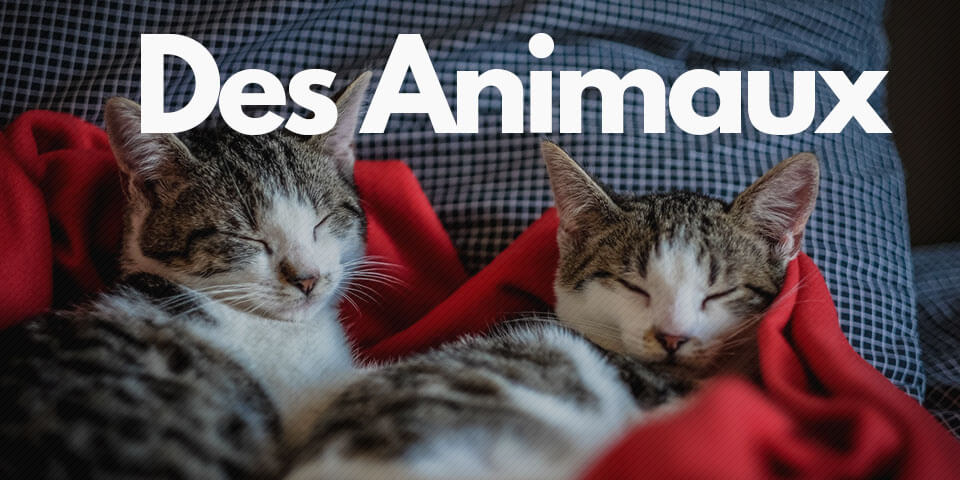

Следующей темой уроков французского языка для начинающих будут названия животных. Изучая новые слова, заодно вспомним французские артикли.
С неопределенным артиклем un употребляются существительные мужского рода. Неопределенный артикль une обозначает существительное женского рода.
- Названия животных
домашние животные:
- кот – un chat
- собака – un chien
- щенок – un chiot
- кошка – une chette
- котенок – un chaton
- мышь – une souris
- утка – un canard
- теленок – un veau
- гусь – une oie
- корова – une vache
- курица – une poule
- заяц, кролик – un lapin
- лошадь – un cheval
- бык – un taureau
- баран – un mouton
- попугай – un perroquet
дикие животные, в природе:
- тигр – un tigre
- волк – un loup
- медведь – un ours
- лиса – un renard
- змея – un serpent
- жираф – une girafe
- зебра – un zèbre
- верблюд – un chameau
- слон – un éléphant
- обезьяна – un singe
морские животные:
- черепаха – une tortue
- рыба – un poisson
- лягушка – une grenouille
- крокодил – un crocodile
- дельфин – un dauphin
- кит – une baleine
- акула – un requin
- пингвин – un pingouin
птицы и насекомые:
- сова – l’hibou
- муха – une mouche
- паук – une araignée
- чайка – une mouette
- комар – un moustique
- лебедь – un cygne
- пчела – une abeille
- червяк – un ver
- бабочка – un papillon
- улитка – un escargot
- существительные и глаголы по теме
- лаять – aboyer
- мычать – mugir
- мяукать – miauler
- царапать – griffer
- всеядный – un omnivore
- травоядный – un herbivore
- дикий – sauvage
- домашний – domestique
- преданный – fidèle
- животное – un animal (des animaux)
- полосатый – rayé
- крыло – une aile
- насекомое – un insecte
- млекопитающее – un mammifère
- рептилия – un reptile
Нравится статья? Поддержи наш проект и поделись с друзьями!
Оставьте свой комментарий
Learning animals names in French language is a great asset in terms of vocabulary. Whether you want to talk about your favorite animal, the pets you own or even develop your understanding of documentaries related to the wild world, this will come in handy.
In this lesson, I will share with you a useful vocabulary list of animals in French with their English translation, all names classified depending on the category they belong to.
This lesson gives you the vocabulary necessary to memorize animals names in French, but if you want to develop your French vocabulary and listening skills in a fun way, Lingopie might work well for you. I love the way, you can learning a lot by simply watching your favorite movies and TV shows. What I like the most is the possibility to read the script in my target language and click on the words I don’t know and learn them. I use it for English and this helps me improve my vocabulary and listening skills, especially with the flashcards features that I can use to review the new words. If you’re interested, you can take the 7-day free trial. I am sure you would like too. And if you are lucky that their promo is still on, you might get 70% off.
1. Les animaux de compagnie / animaux domestiques: pets
The French word for a pet is un animal de compagnie or un animal domestique.. In the plural, it becomes des animaux de compagnie ou domestiques.
Here is a list of common pets that you can find in people’s house.
-
Le chien => dog
-
Le chat => cat
-
La souris =>mouse
-
Le hamster =>hamster
-
La tortue => tortue
-
Le Lapin => rabbit
-
Le perroquet => parrot
-
Le poisson rouge => goldfish
2. Les animaux de la ferme: farm animals
These are the names of animals that you can find in a regular French farm.
-
La poule =>hen
-
Le coq => rooster
-
Le mouton => sheep
-
La chèvre => goat
-
La vache => cow
-
Le canard => duck
-
Le cochon => pig
-
La dinde => turkey
-
Le cheval => horse
-
L’âne => donkey
3. Les animaux sauvages: wild animals
Wild animals can be found in the forest, in nature, zoos, or observed in safaris.
Below is a list of the animals categorized as wild animals.
-
L’oiseau => bird
-
Le hibou => owl
-
Le lion => lion
-
Le tigre => Tiger
-
L éléphant => éléphant
-
La girafe => giraffe
-
Le léopard => leopard
-
Le guépard => cheetah
-
L’hippopotame => hippopotamus
-
Le rhinocéros => rhinoceros
-
Le chameau => Camel
-
l’ours => bear
-
La hyène => hyena
-
Le lièvre => hare
-
le singe => monkey
-
Le gorille => gorilla
-
Le chimpanzé => chimpanzee
-
Le zèbre => zébra
-
L’antilope => antelope
-
Le cerf => deer
-
L’écureuil => squirrel
-
Le loup => wolf
-
Le renard => fox

4. Sea animals : les animaux marins
The equivalent English to French translation of sea animals is les animaux marins or les animaux aquatiques for water animals.
-
Le poisson => fish
-
La baleine => whale
-
Le requin => shark
-
Le dauphin => daulphin
-
La crevette => shrimp
-
Le homard => lobster
-
Le crabe => crab
-
L étoile de mer => Starfish
-
La méduse => Jellyfish
-
L’anguille(f) => eel
-
l’hippocampe => sea horse
-
la pieuvre => octopus
-
le calamar => squid
-
le phoque => seal
5. Reptiles : les reptiles
-
Le serpent => snake
-
Le lézard => lizard
-
Le crapaud => toad
-
La grenouille => frog
-
La tortue => turtle
-
Le crocodile => crocodile
-
Le caméléon => chameleon
6. Les insectes: insects
-
L’araignée => spider
-
La mouche => fly
-
La fourmi => ant
-
Le criquet => cricket, locust
-
La mante religieuse => praying mantis
-
L’abeille => bee
-
La guêpe => wasp
-
Le papillon => butterfly
-
Le moustique => mosquito
-
Le cafard => cockroach
-
La coccinelle => ladybug
7. Quiz to practice your French animal vocabulary
Here is a practice exercise for you to check your knowledge about animals in French language. Take the quiz below and happy learning !
For more exercises, check out this language learning directory My language learning hub
If you are considering taking classes, we recommend Lingoda for online group classes or private classes. Their classes are affordable (10 to 12 euros per one hour group class), well structured according to CEFR guidelines, with a communicative approach that gets you quickly comfortable speaking. You can join their next challenge, the Lingoda Sprint. If you commit to taking 1 class a day for 2 months (60 classes), without missing any class, you get 100% cashback. and if you choose to take a class every two days (30 classes), you will get 50% cashback.
This is a great way to accelerate your learning with intensive classes. However, this is not for everyone. If you can’t commit daily, you better join their regular classes. that you can try for free here.
Related lessons
Colors in French
House vocabulary
Verb avoir (to have)
French
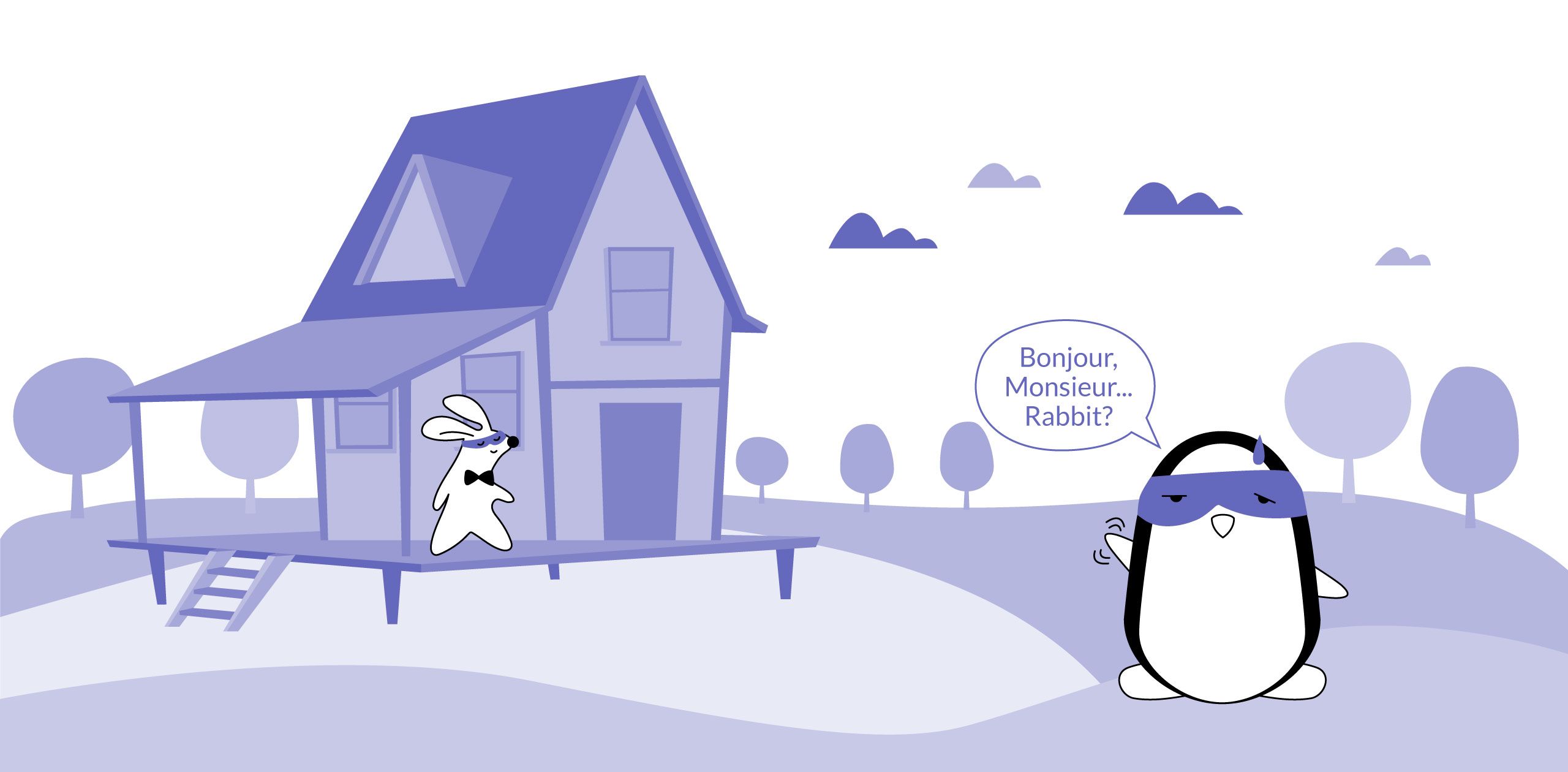
There are currently billions of animals on our planet, and the moment will surely come when you will have to discuss at least one of them with a native French speaker. That means that you should learn some basic animal vocabulary in the French language — and we’re here to help.
First of all, don’t worry — learning the French animal names doesn’t have to be hard. In fact, it can be fun and exciting, especially if you use interesting exercises or practice methods.
Secondly, we’re here to offer you just that. In the article below, you’ll learn the French words for the animals along with some interesting tips for learning them.
Ready to boost your vocabulary and learn how to say “a cat,” “a dog,” and “a seal” in French? Then read on!
Learn French with Langster
French Animals — the Basics
First, let’s dive into the French translation of the most common animal names. Below, you will find several lists of the French words related to different types of wild and domestic fauna.
Note that we often use the masculine name of a certain species — however, there are also feminine forms if you know the animal is female. You might not come across them as often as the ones we mention below, but if you’re interested, you can also check them in the dictionary (just remember to do that correctly).
Pets — Les Animaux Domestique
Animaux domestic (domestic animals) are not the only name the French have for pets. More often, you will hear the phrase “animal de compagnie” used to mean “pet” — literally, “animal of company.” Here’s a short vocabulary list of the most common animaux de compagnie in French
(female: une chatte, kitten: un chaton)
(female: une chienne, puppy: le chiot)
The French — as well as many other languages — have their own translation for “meow” — miaou — and “woof” — ouaf.
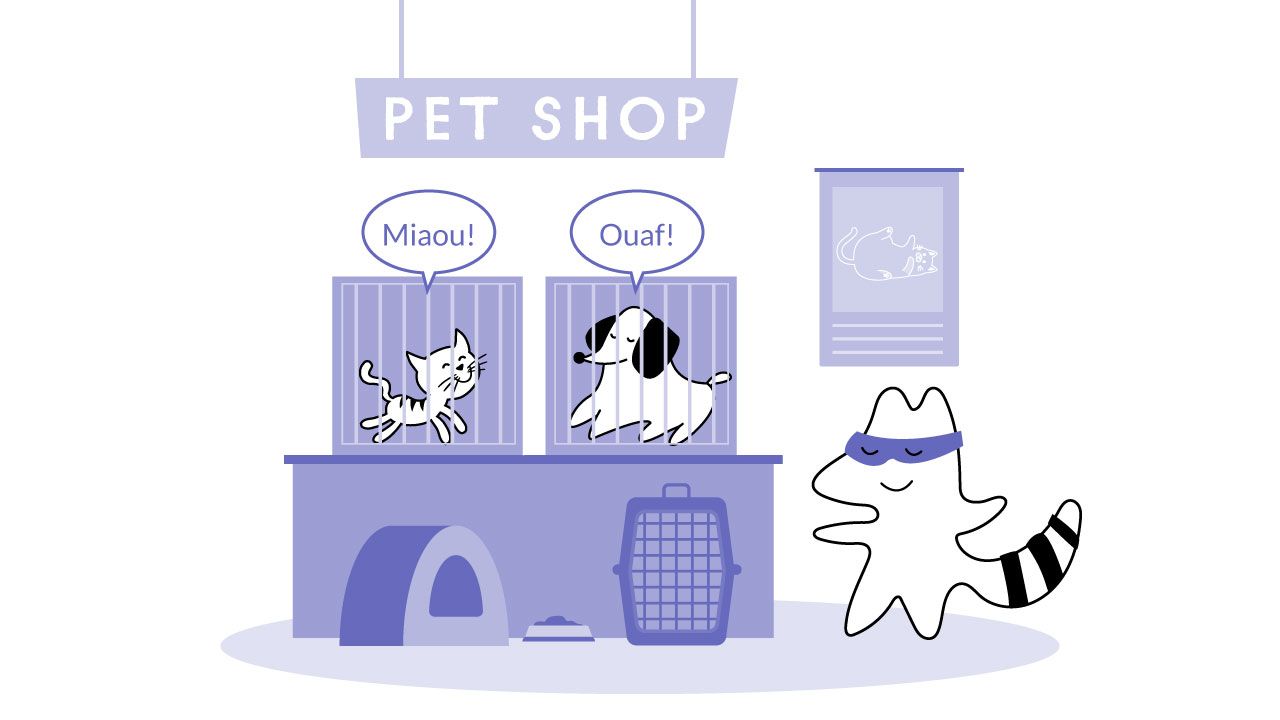
French
English
a goldfish
un cochon d’Inde / un cobaye
a Guinea pig
Farm Animals — Les Animaux de la Ferme
Animaux de la ferme can literally be translated as “animals of the farm,” — nothing challenging there. The same rules work for the other types of animals. For example, you can say les animaux de la mer (animals of the sea) or les animaux de la forêt (forest animals).
Those can also be put in the singular form — for example, “Un poulet est un animal de la ferme.” (A chicken is a farm animal).
There’s a French expression «Oh la vache !» ussed to show surprise, admiration, or disappointment. Its English translation would be «holy cow!»
As in English, people can count the sheep to fall asleep faster in French. However, the French word mouton can be conjugated — so in French, you would count: “Un mouton, deux moutons, trois moutons…”
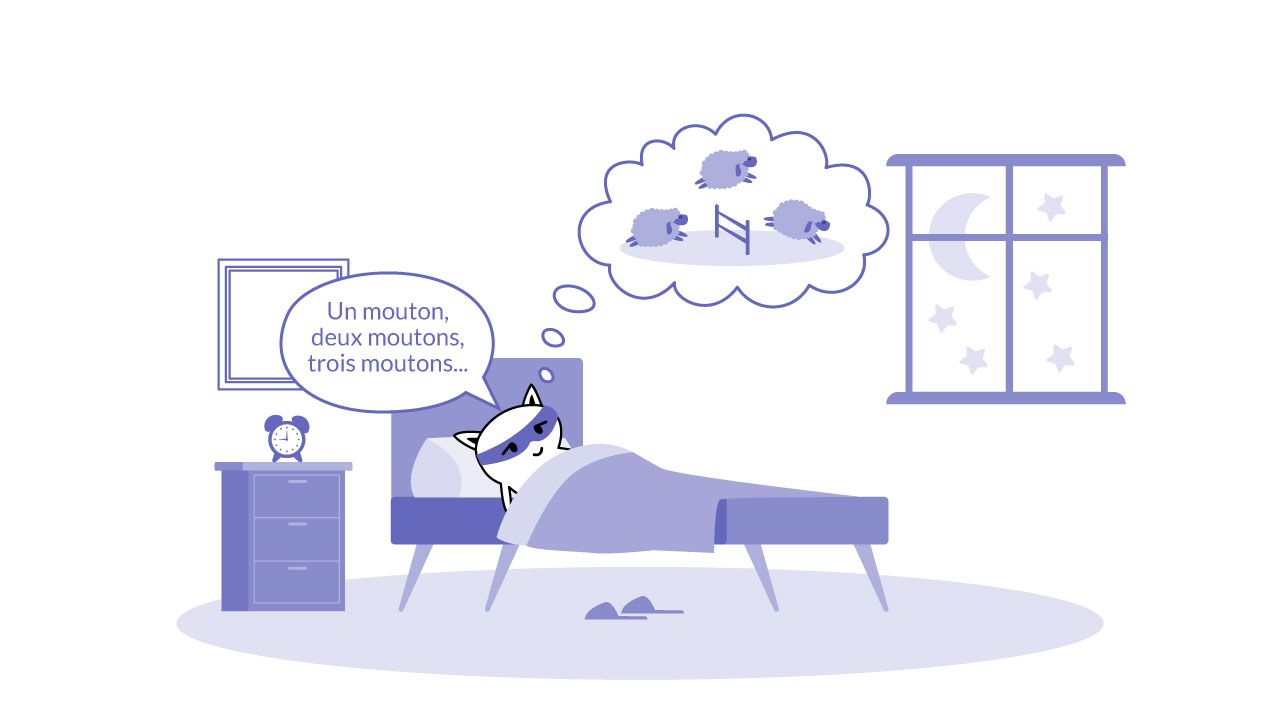
A thing you should note here is that chèvre can also mean goat cheese — but in that case, it would be masculine.
The last word you might have heard in relation to the famous French dish — coq au vin.
Land Wildlife — La Faune Terrestre
When you look at the names of the wild animals (or zoo animals, if you prefer) in French, you can see that many of them are similar to those in the English language. There are also some animal names derived from Latin — for example, un loup (the wolf), from which we have the famous (thanks to House MD) disease lupus.
French
English
the animal kingdom
A fun thing to note here: say the name of the movie Ratatouille out loud slowly. What can you hear? A good French speaker can hear the words “rat and ear.”
French
English
a hedgehog
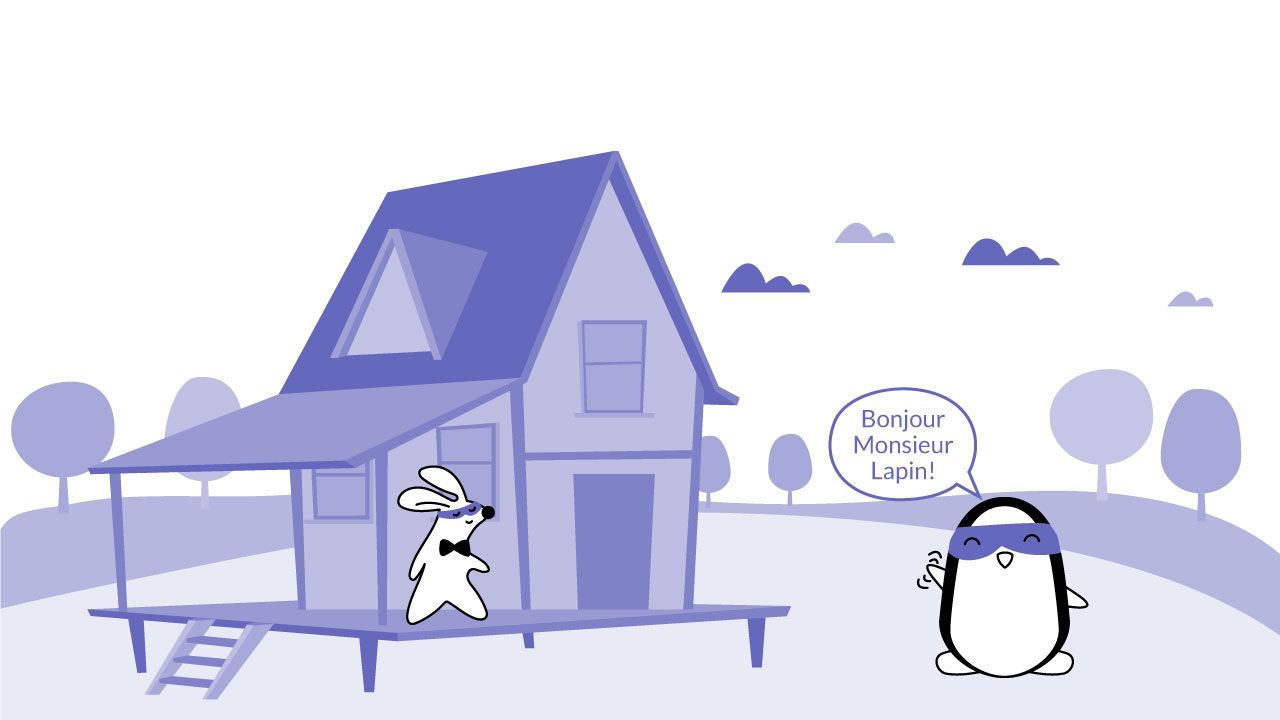
Water Wildlife — La Faune de L’eau
French
English
Sea animals
Remember about the pronunciation here! Un poisson, /puason/ will mean “a fish”, while /puazon/, spelled as poison will mean “poison.”
Are you familiar with the funny trend which grew out of someone googling “seal in French?”
shellfish (as food), literally, “the fruit of the sea”
Flying Fauna — La Faune Volante
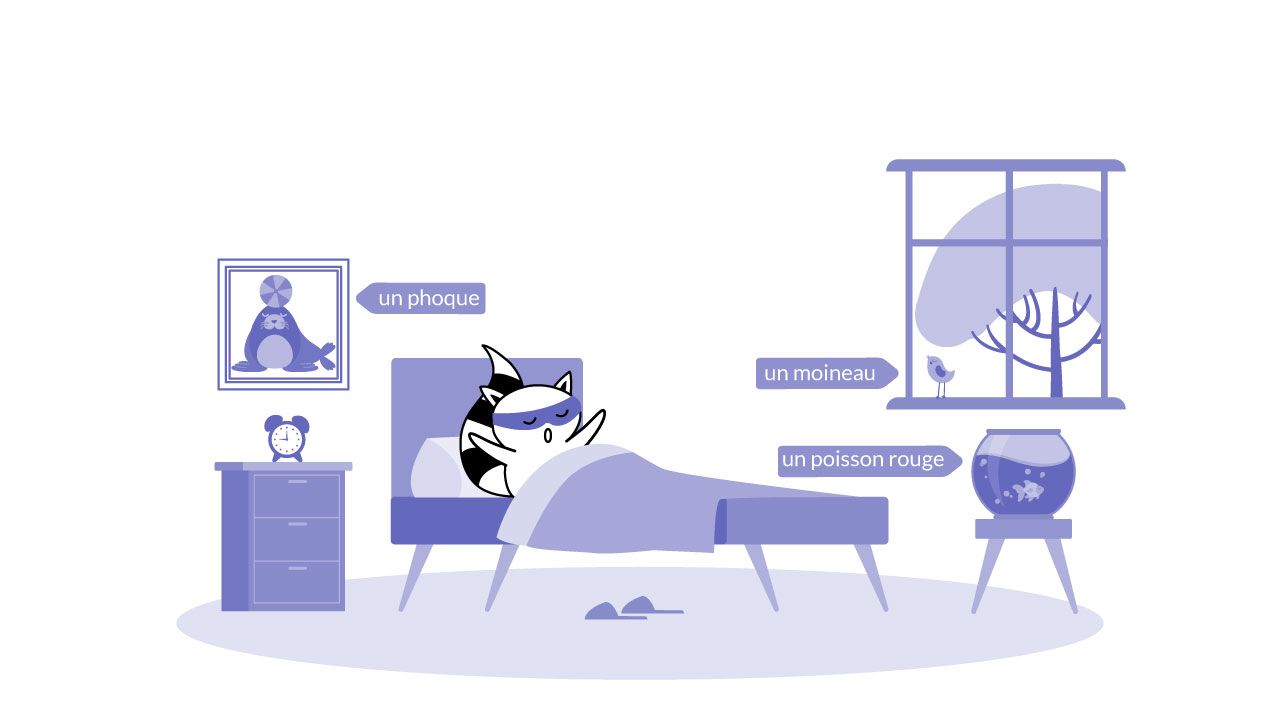
Animals in French — the Issue of Gender
Knowing the French animal vocabulary is not enough if you want to communicate fluently with native speakers. In that case, you also need to know which article to use with which name — even if we’re talking about the simplest words, such as chat (cat) or chien (dog).
First of all, most of the French animals have two different words for the same species of the different gender — for example, un chat and une chatte (male and female cat). Sometimes, just the ending changes, so this shouldn’t be a problem for you to learn them.
Moreover, as you speak about the animal in general, you will most often use just one gender, choosing one of the words we mentioned above.
In most cases, the main thing that changes if you decide to speak about the female or male animal is the article. Check our grammar point about the gender in living beings to learn more about that.
Nevertheless, there are some French animal words that refer separately to the female or male animal of a certain species. You can see that in the examples of the French words — for instance, un cheval (a horse), un étalon (a stallion), and une jument (a mare).
How to Practice Your Animal Vocabulary
Don’t just memorize the words you have above — if you do that, the only thing that might be left in your head is how to say “dog” and “cat” in French. Instead, use other, more engaging methods.
For example, create flashcards which help you remember the words better; do exercises online to practice them more; watch French movies, TV shows and YouTube videos related to the topic so you can immerse yourself with the French words; and, finally, download the apps that might help you learn them faster — such as Langster.
Final Thoughts: Learn the French Animal Vocabulary Easily
French vocabulary regarding the animals is very broad — so don’t expect yourself to learn all of it quickly. Instead, remember to practice and use the words in context more.
For better results, start simple — with “chien” and “chat.” Try to notice them when watching French movies or reading French stories, and use them more often in conversations. Then, slowly add the remaining vocabulary related to different animals so that you’re not stuck with just “chien” and “chat” forever.
Remember that you might not need all of that vocabulary in the future. Focus on the words that seem the most important to you — for now, that will be enough. And remember to have fun — after all, learning French should be exciting, not daunting.
Les animaux
le mâle (il) самец (он)
la femelle (elle) самка (она)
le petit (= le bébé, il) малыш (= ребенок, он)
Les animaux domestiques Домашние животные
Les animaux d’appartement ou de compagnie (f) Домашний питомец
le chat/la chatte (le chaton) кот/ кошка (котенок)
le chien/la chienne (le chiot) собака (самец)/ собака (самка) / щенок;
un oiseau (dans une cage) птица (в клетке)
un poisson, une tortue (dans un aquarium ou un bassin) рыба, черепаха (в аквариуме или бассейне);
un hamster, une souris (dans une cage) хомяк, мышь (в клетке)
Quelques animaux de la ferme ou d’élevage (m) фермерские животные
le cheval/ la jument (le poulain) лошадь / кобыла (жеребенок)
le mouton/la brebis (un agneau) баран/ овца (ягненок)
le bœuf/la vache (le veau)бык/ корова (теленок)
le bouc/la chèvre (le chevreau) козел/ коза (козленок)
le dindon/la dinde (le dindonneau)индюк/ индейка (индюшонок)
le cochon/la truie (le porcelet) свинья / свинья (самка)(поросенок)
le lapin/la lapine (le lapereau)кролик/ крольчиха (крольчонок)
le coq/la poule (le poulet, le poussin)петух / курица (цыпленок)
le jars/l’oie (un oison)гусь/гусыня (гуменок)
le canard/ la cane (le caneton)утка/ утка (самка) (утенок)
On élève généralement les animaux pour l’alimentation. Животноводство обеспечивает продуктами питания.
un bœuf (ou un taureau pour la reproduction), un cochon (= un porc), un mouton (ou un bélier pour la reproduction)бык, свинья (самец), баран или таран для репродукции.
Les principaux animaux du zoo
Dans un vivarium
- un caméléon хамелеон
- un crocodile крокодил
- un serpent змея
- un lézard ящерица
Dans un aquarium
- un requin акула
- un dauphin дельфин
- une raie скат
l’ours/l’ourse медведь /медведица
la girafe жираф
le zèbre зебра
le loup волк
le chameau верблюд
le tigre тигр
le singe обезьяна
l’hippopotame бегемот
le léopard леопард
le lion/la lionne (le lionceau)лев/львица (львенок)
Le lion/la lionne, le tigre/la tigresse, le léopard sont des fauves (m)Лев/львица, тигр/ тигрица, леопард — хищники ;
le loup/la louve волк /волчиц
un oiseau птица
un perroquet попугай
un aigle орел
une autruche страус
Les animaux sont de race (f) pure (- les deux parents sont de la même espèce animale) ou non (un chien bâtard, un chat de gouttière. Породистые животные (чистой породы (-оба родителя того же животного вида) или нет (беспородная собака, уличный кот).
Les animaux domestiques de race pure ont un pedigree (un certificat d’origine). Домашние породистые животные имеют родословную.
La vie des bétes Жизнь животных
Il faut s’occuper des animaux…Животными нужно заниматься
sortir un chien выгуливать собаку
le faire toiletter (= le faire tondre et laver) расчёсывать, мыть, приводить в порядок
lui donner un bain купать её
le faire courir играть с ней (заставлять бегать)
lui donner à boire, à manger (- le nourrir) накормить и напоить её
le brosser расчёсывать её
jouer avec lui играть с ней
le caresser ласкать её
l’amener chez le vétérinaire (= le docteur des animaux) вести её к ветеринару
le faire vacciner (= faire des piqûres contre certaines maladies) вакцинировать его
le soigner quand il est malade лечить когда она болеет
nettoyer la cage d’un hamster ou d’un oiseau, l’aquarium d’un
poisson чистить клетку хомяка или птицы, чистить аквариум рыбки
Les actions vitales
Les animaux животные
guettent (= surveillent pour attraper)выслеживать
chassent охотятся
pèchent ловят рыбу
mangent едят
boivent пьют
dorment спят
se battent дерутся
se reproduisent размножаются
mettent bas (donnent naissance)рожают
pondent (des œufs) несут яйца
couvent (- tiennent les œufs au chaud)высиживают яйца
naissent рождаются
meurent умирают.
Les déplacements перемещения
En général, les animaux в основном животные
- Marchent идут
- Sautent прыгают
- Courent бегают
- grimpent (aux arbres) карабкаются (на деревья)
- rampent (- se déplacent sur le ventre) ползают
Les oiseaux птицы
- Volent летают
certains nagent ou plongent некоторые плавают и ныряют
Les poissons
- nagent рыбы плавают
- Sautent прыгают
- Plongent ныряют
Le langage des animaux язык животных
Le chien aboie (aboyer). Собака лает.
Le chat miaule (miauler).Кошка мяукает.
L’oiseau chante, gazouille (gazouiller). Птица поет, щебечет.
Le coq chante (chanter). Петух поет.
La poule caquette (caqueter). Курица кудахчет.
La vache meugle (meugler). Корова мычит.
Le cheval hennit (hennir). Лошадь ржет.
Le mouton bêle (bêler). Баран блеет.
Le cochon grogne (grogner). Свинья хрюкает.
Le lion/le tigre rugit (rugir). Лев/тигр рычит.
Pour aller plus loin
Pour renforcer le sens :
être heureux comme un poisson dans l’eau быть счастливым как рыба в воде
être malin comme un singe быть хитрым как лиса
C’est une vraie tigresse: elle est très agressive et jalouse. Это — настоящая тигрица: она очень агрессивна и завистлива.
être doux comme un agneau смирный (кроткий) как ягнёнок
être bête comme une oie быть глупым как пробка
être sale comme un cochon быть грязным как свинья
être frisé comme un mouton быть кудрявым как барашек
être bavard comme une pie (parler beaucoup)быть болтливым как сорока
avoir une faim de loup (= avoir très faim) ≠ avoir un appétit d’oiseau (= manger très peu) быть голодным как волк ≠ есть как птичка
Il fait un froid de canard = il fait très froid.Собачий холод.
Il fait un temps de chien = très mauvais. Стоит собачья погода.
se coucher comme les poules = très tôt ложиться очень рано, ложиться с курами
Рейтинг 4,9 на основе 27 голосов
Learn the names + gender of pets, farm animals and more in French.
Learn how to ask and answer simple questions about animals:
Qu’est-ce que c’est? What is it?
C’est un chat. It’s a cat.
As-tu un animal? Do you have a pet?
J’ai … I have …
Je n’ai pas d’animal. I don’t have a pet.
Qu’est-ce que tu aimes? What do you like?
J’aime … I like
Je n’aime pas … I don’t like
Animals in French Vocabulary, Youtube Video, free Worksheet, and an Online Quiz.
Pets in French
Les animaux domestiques
un poisson (m) a fish
un chien (m) a dog
un chat (m) a cat
un lapin (m) a rabbit
un hamster (m) a hamster
un cochon d’Inde (m) a pig
Farm Animals in French
Les animaux de la ferme
un canard (m) a duck
un dindon (m) a turkey
un coq( m) a cockerel
une vache (f) a cow
un cheval (m) a horse
(cheval changes to chevaux in the plural)
un mouton (m) a sheep
un cochon (m) a pig
un âne (m) a donkey
une chèvre (f) a goat
Plus:
une poule (f) a hen
More Animals:
un caméléon (m) a chameleon
un serpent (m) a snake
un héron (m) a heron
une mouette (f) a seagull
un lézard (m) a lizard
un écureuil (m) a squirrel
un hibou (m) a heron
un crabe (m) a crab
une araignée (f) a spider
un papillon (m) a butterfly
Which animals, birds, insects do you see on a regular basis?
Do you pass any on your way to school? Would you spot the heron in the video clip below if you were going by? Are there always the same birds in the sky?
Look up the names in French and write them down.
They might be:
Un pigeon (m) a pigeon
Un renard (m) a fox
Un moineau (m) a sparrow
Un rat (m) a rat
Un écureuil (m) a squirrel
Un scarabée (m) a beetle
Videos
French + English Subtitles:
Only French Subtitles:
Online Quiz
This quiz is also available on its own separate page here:
Animals in French Quiz
#1. Qu’est-ce que c’est?
C’est un hibou.
C’est un hibou.
C’est un lapin.
C’est un lapin.
C’est un rat.
C’est un rat.
#2. Qu’est-ce que c’est?
C’est un canard.
C’est un canard.
C’est un chien.
C’est un chien.
C’est une mouette.
C’est une mouette.
#3. Qu’est-ce que c’est?
C’est un cheval.
C’est un cheval.
C’est une vache.
C’est une vache.
C’est un âne.
C’est un âne.
#4. Some turkeys.
des dindons
des dindons
des canards
des canards
des cochons d’Inde
des cochons d’Inde
#5. Qu’est-ce que c’est?
C’est un mouton.
C’est un mouton.
C’est un cheval.
C’est un cheval.
C’est une chèvre.
C’est une chèvre.
#6. Qu’est-ce que c’est?
C’est un lézard.
C’est un lézard.
C’est un héron.
C’est un héron.
C’est un papillon.
C’est un papillon.
#7. Qu’est-ce que c’est?
C’est un héron.
C’est un héron.
C’est un hibou.
C’est un hibou.
C’est un poisson.
C’est un poisson.
#8. Qu’est-ce que c’est?
C’est un cheval.
C’est un cheval.
C’est un chien.
C’est un chien.
C’est un chat.
C’est un chat.
#9. Qu’est-ce que c’est?
C’est une araignée.
C’est une araignée.
C’est une chèvre.
C’est une chèvre.
C’est un lézard.
C’est un lézard.
#10. Qu’est-ce que c’est?
C’est une chèvre.
C’est une chèvre.
C’est une vache.
C’est une vache.
C’est un cochon.
C’est un cochon.
#11. Qu’est-ce que c’est?
C’est une araignée.
C’est une araignée.
C’est un papillon.
C’est un papillon.
C’est un hamster.
C’est un hamster.
#12. Qu’est-ce que c’est?
C’est un écureuil.
C’est un écureuil.
C’est un canard.
C’est un canard.
C’est un serpent.
C’est un serpent.
#13. Qu’est-ce que c’est?
C’est un hibou.
C’est un hibou.
C’est un chat.
C’est un chat.
C’est un héron.
C’est un héron.
#14. Qu’est-ce que c’est?
C’est un crabe.
C’est un crabe.
C’est un coq.
C’est un coq.
C’est un cochon d’Inde.
C’est un cochon d’Inde.
#15. Qu’est-ce que c’est?
C’est un poisson.
C’est un poisson.
C’est un serpent.
C’est un serpent.
C’est un cheval.
C’est un cheval.
– –
Video Transcript
+ Free PDF Exercise:
Worksheet
Animals in French
Les Animaux!
As-tu un animal?
Oui, j’ai un chien.
Et toi? Tu as un animal? Oui, j’ai un chat!
Et toi? As-tu un animal? Oui! J’ai des poissons.
Tu as un animal? Oui, j’ai des lapins.
As-tu un animal? Oui, j’ai une souris!!
Moi, je n’ai pas d’animal, mais j’aime les papillons et j’aime les araignées.
Tu aimes les araignées?
Non! Moi, je n’aime pas les araignées!
Je préfère les cochons d’Inde!
Qu’est-ce que c’est?
Qu’est-ce que c’est? C’est un caméléon!
Qu’est-ce que c’est? C’est un serpent!
Qu’est-ce que c’est? C’est un poisson.
Qu’est-ce que c’est? C’est un héron!
Qu’est-ce que c’est? C’est une mouette.
Qu’est-ce que c’est? C’est un lézard.
Qu’est-ce que c’est? C’est un écureuil!
Qu’est-ce que c’est? C’est un chien!
Qu’est-ce que c’est? C’est un hibou.
Et voici un crabe!
Les Animaux de la Ferme:
Des canards! Des dindons! Des vaches! Des chevaux! Des moutons! Des chèvres!
Un cochon. Un âne. Une chèvre. Un coq. Un mouton. Un cheval. Une vache.
VOCABULARY at the end of the video:
Les Animaux Domestiques:
Un chien. Un chat. Un poisson. Un lapin. Un cochon d’Inde. Un hamster. Une souris.
Les Animaux de la Ferme:
Un canard. Un dindon. Un coq. Un mouton. Un âne. Un cheval. Un cochon. Une vache. Une chèvre.
Et encore!
Un papillon. Un caméléon. Un serpent. Un héron. Un hibou. Un lézard. Un écureuil. Une araignée. Une mouette. Un crabe.
Je n’aime pas ..!
For practice describing animals in French by their colour go to:
Animals + Colours in French

